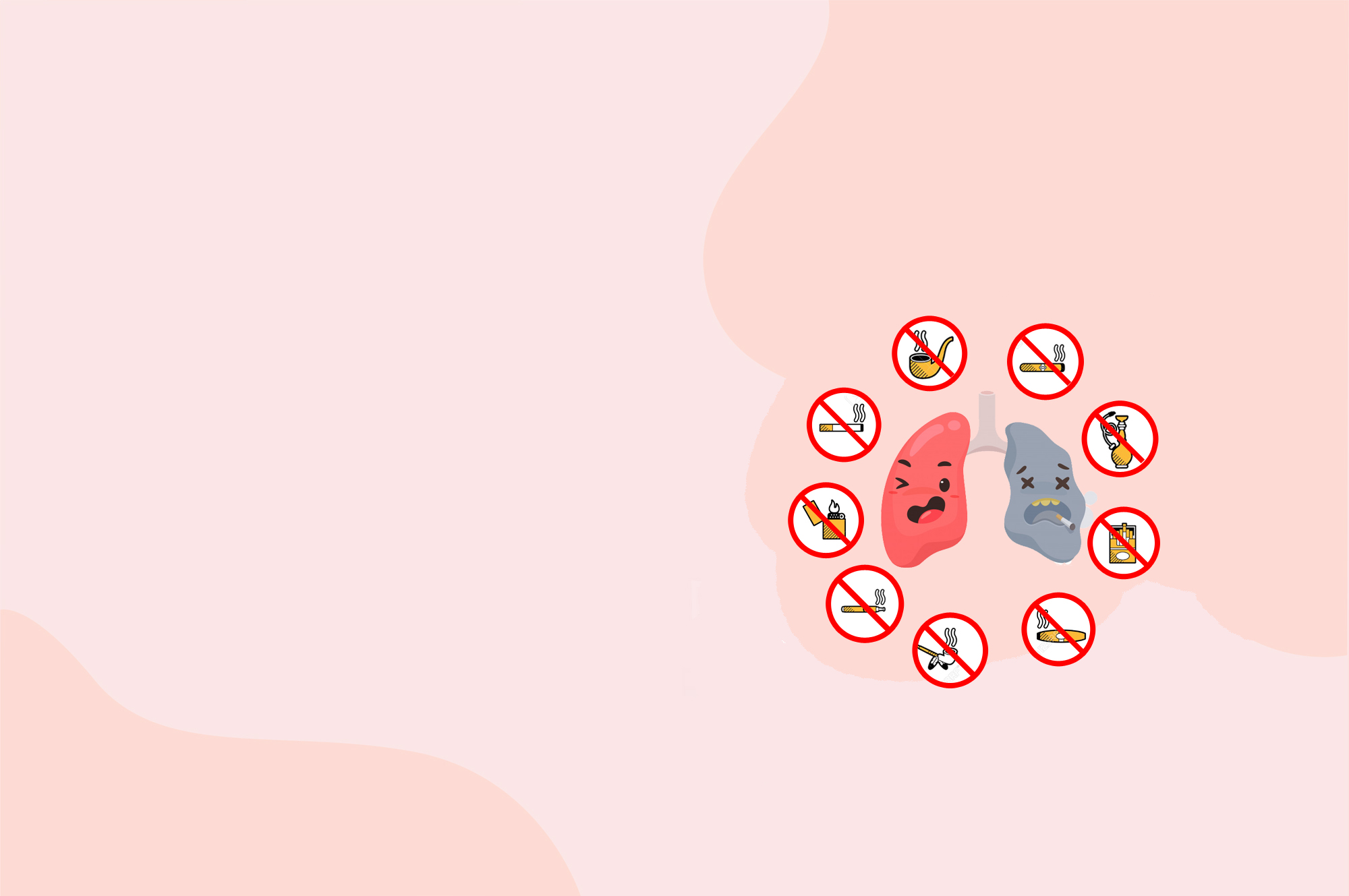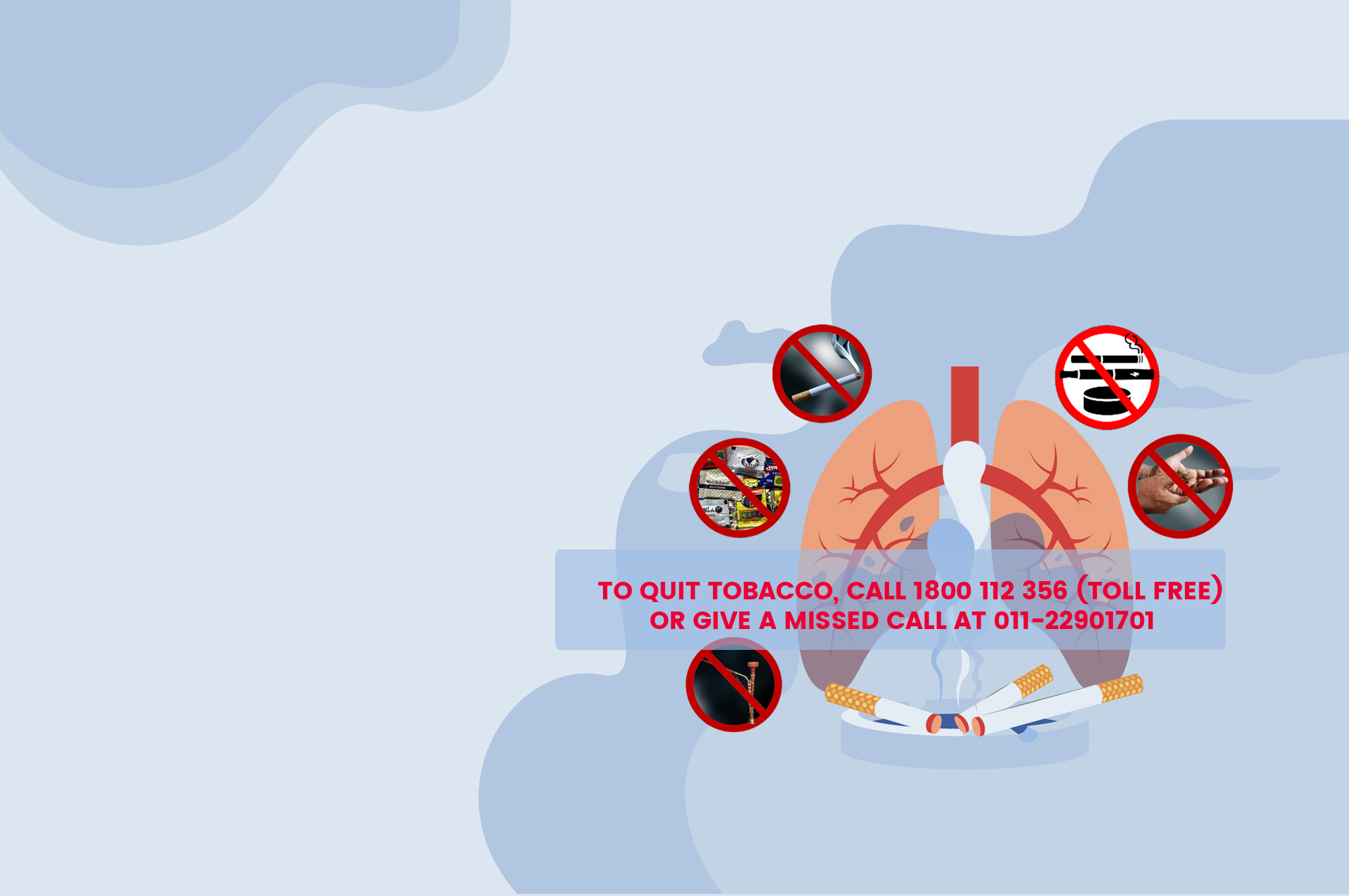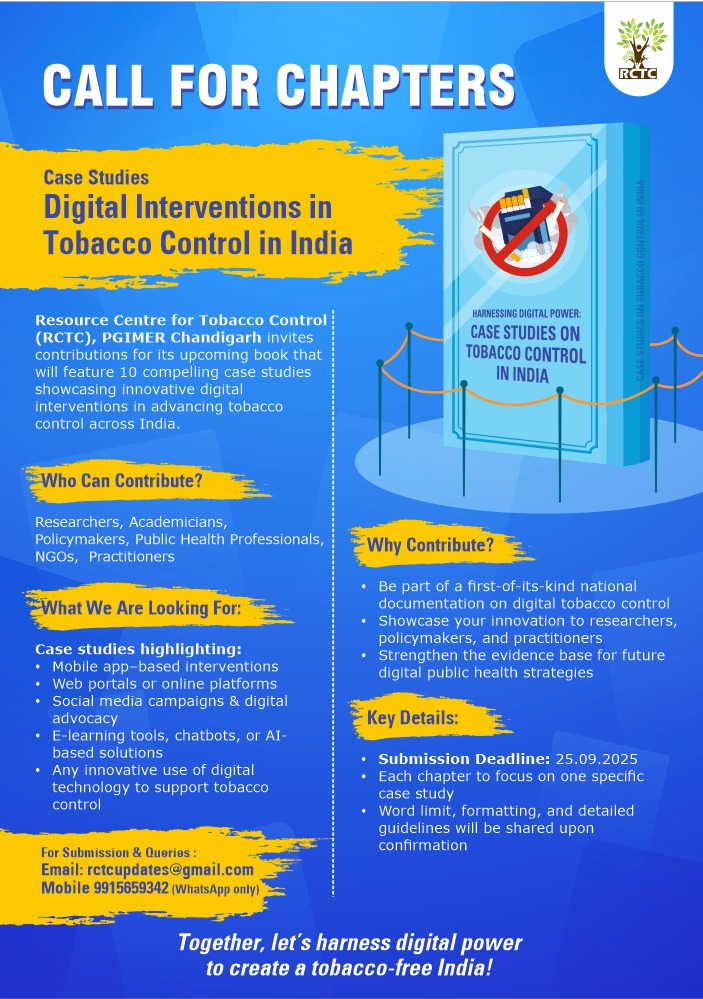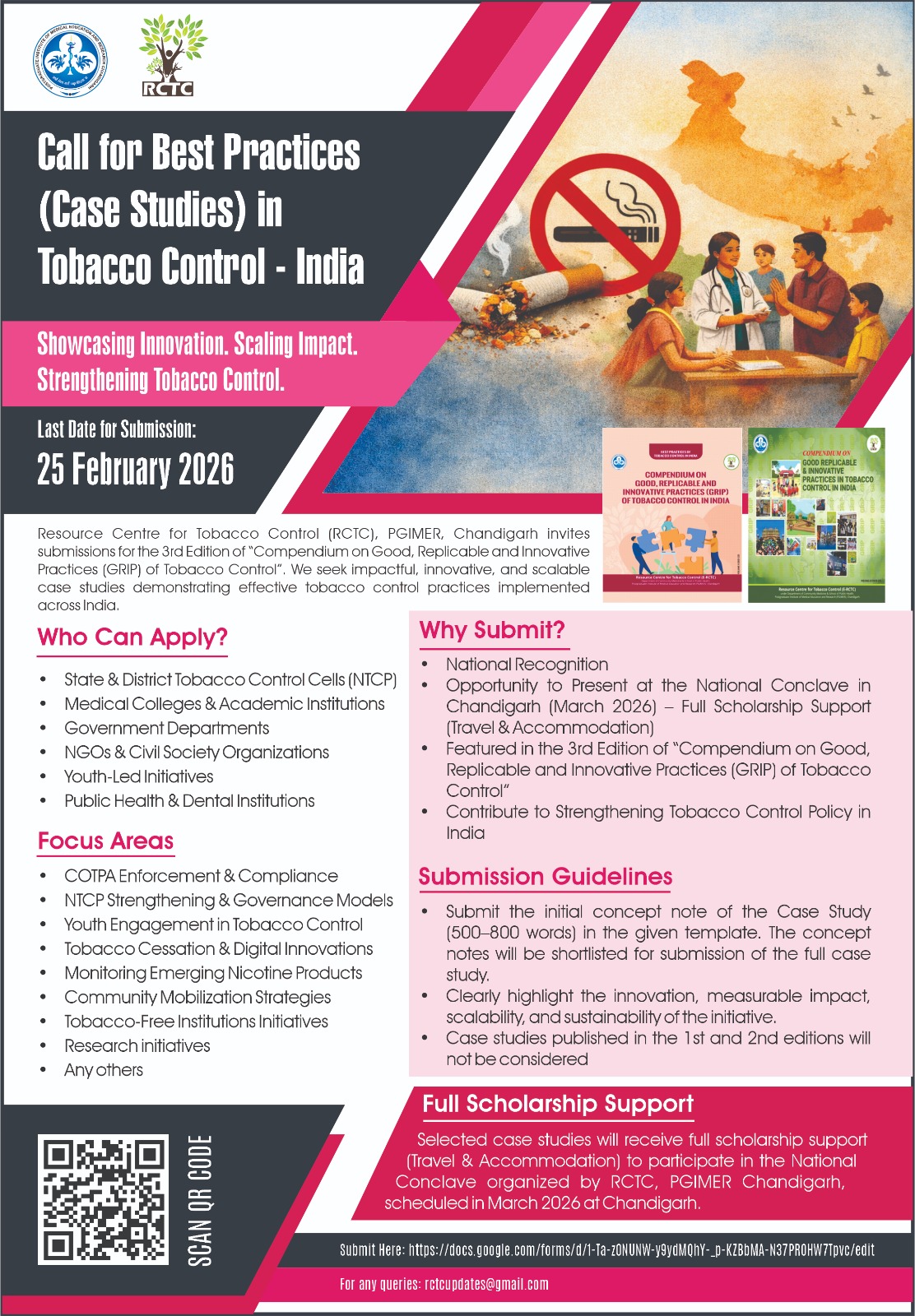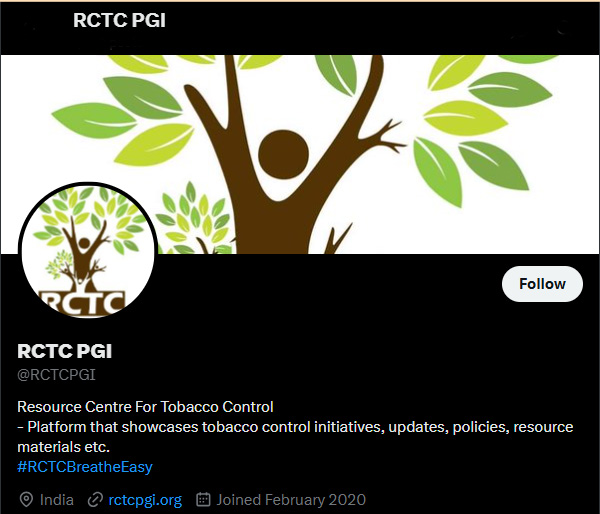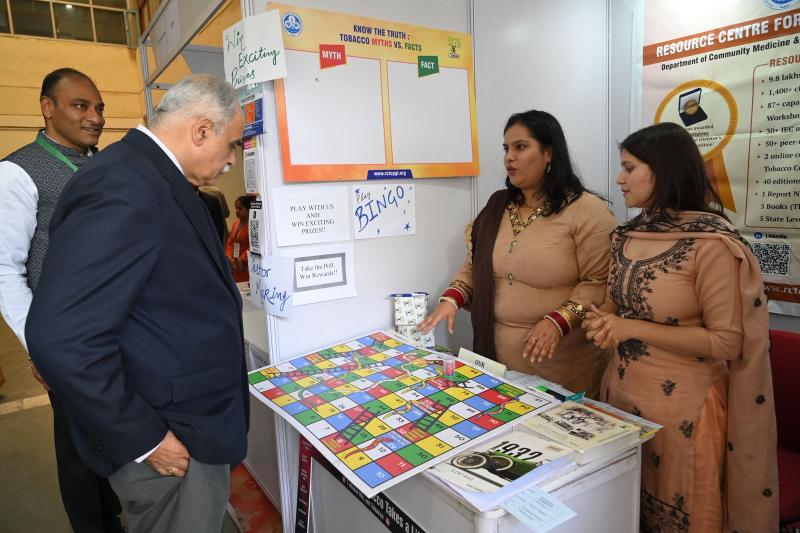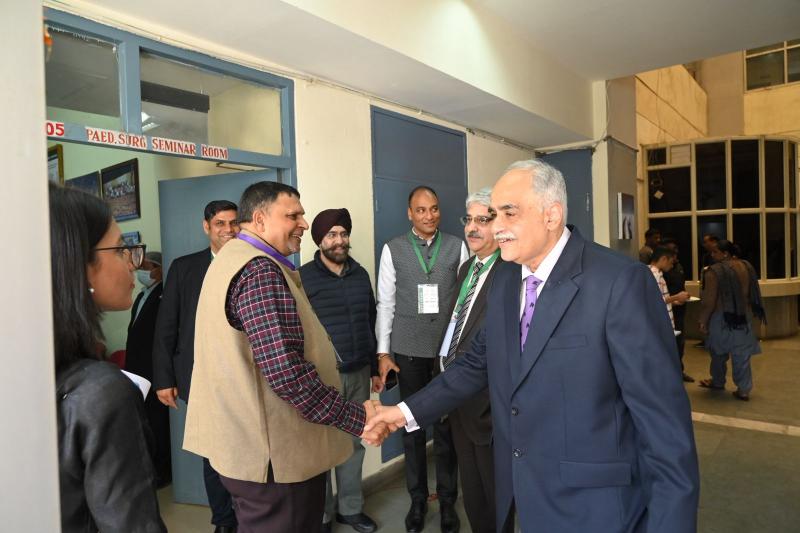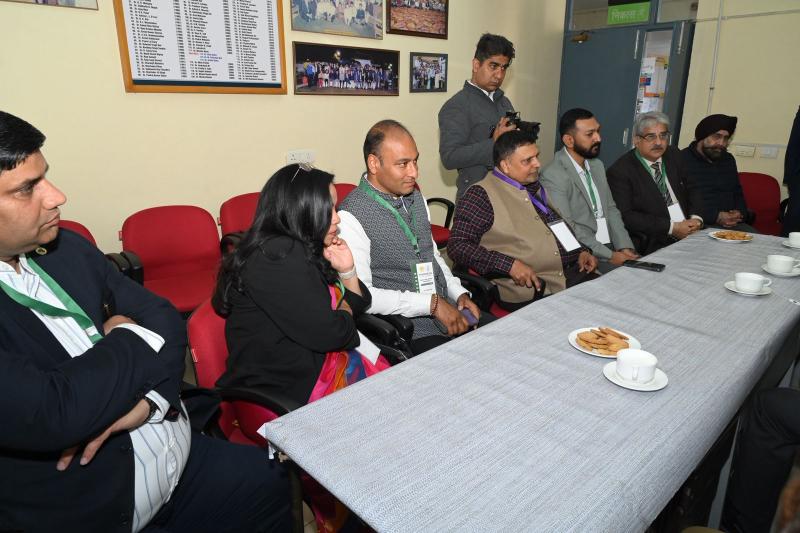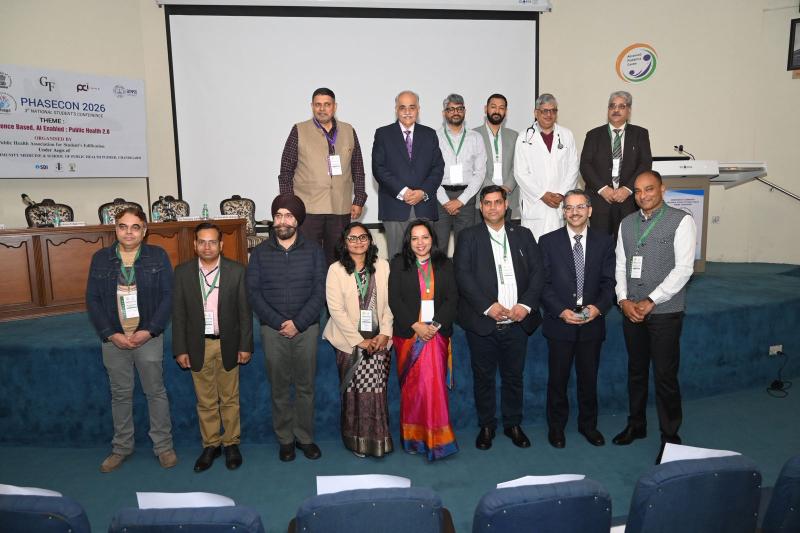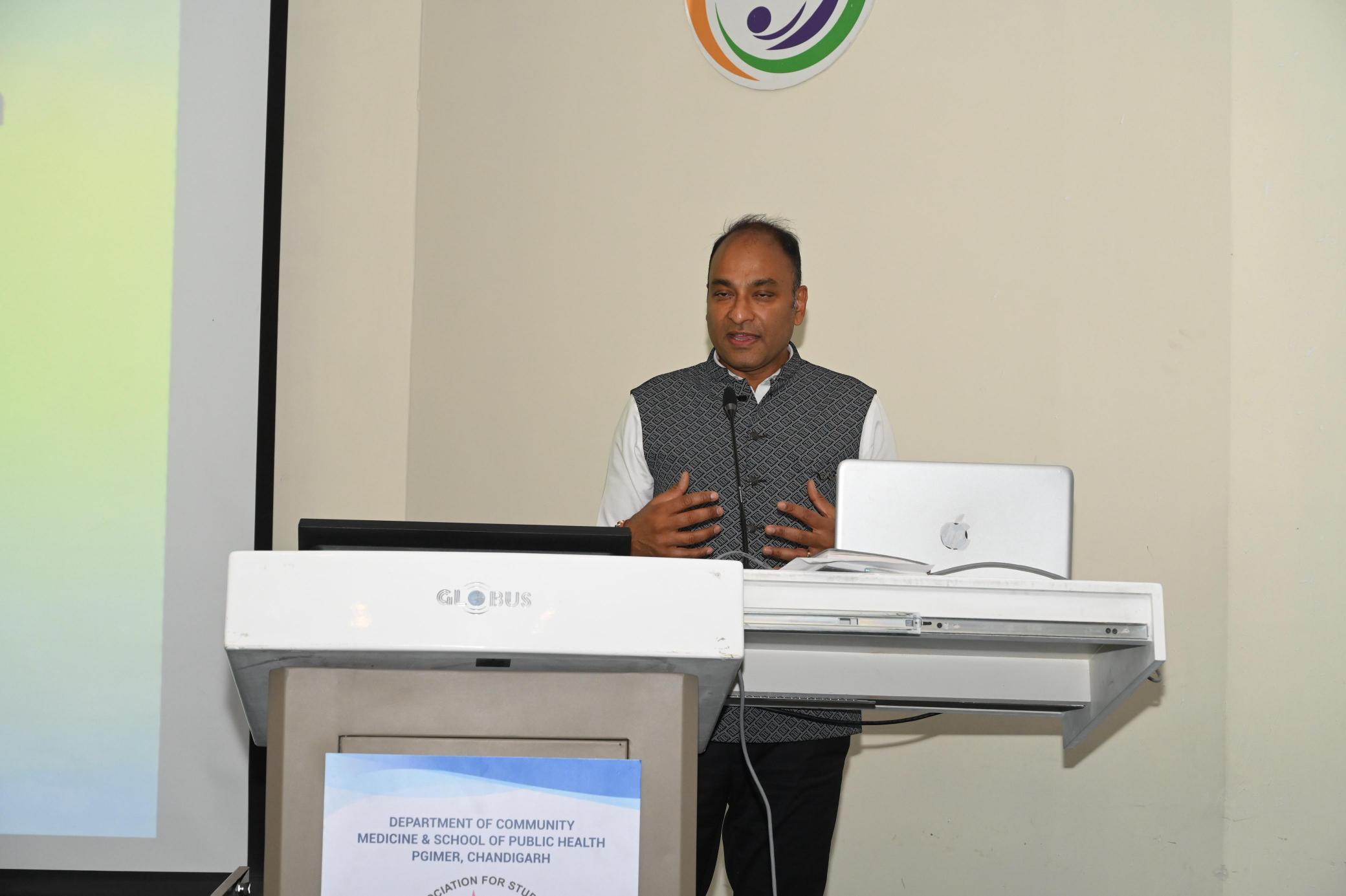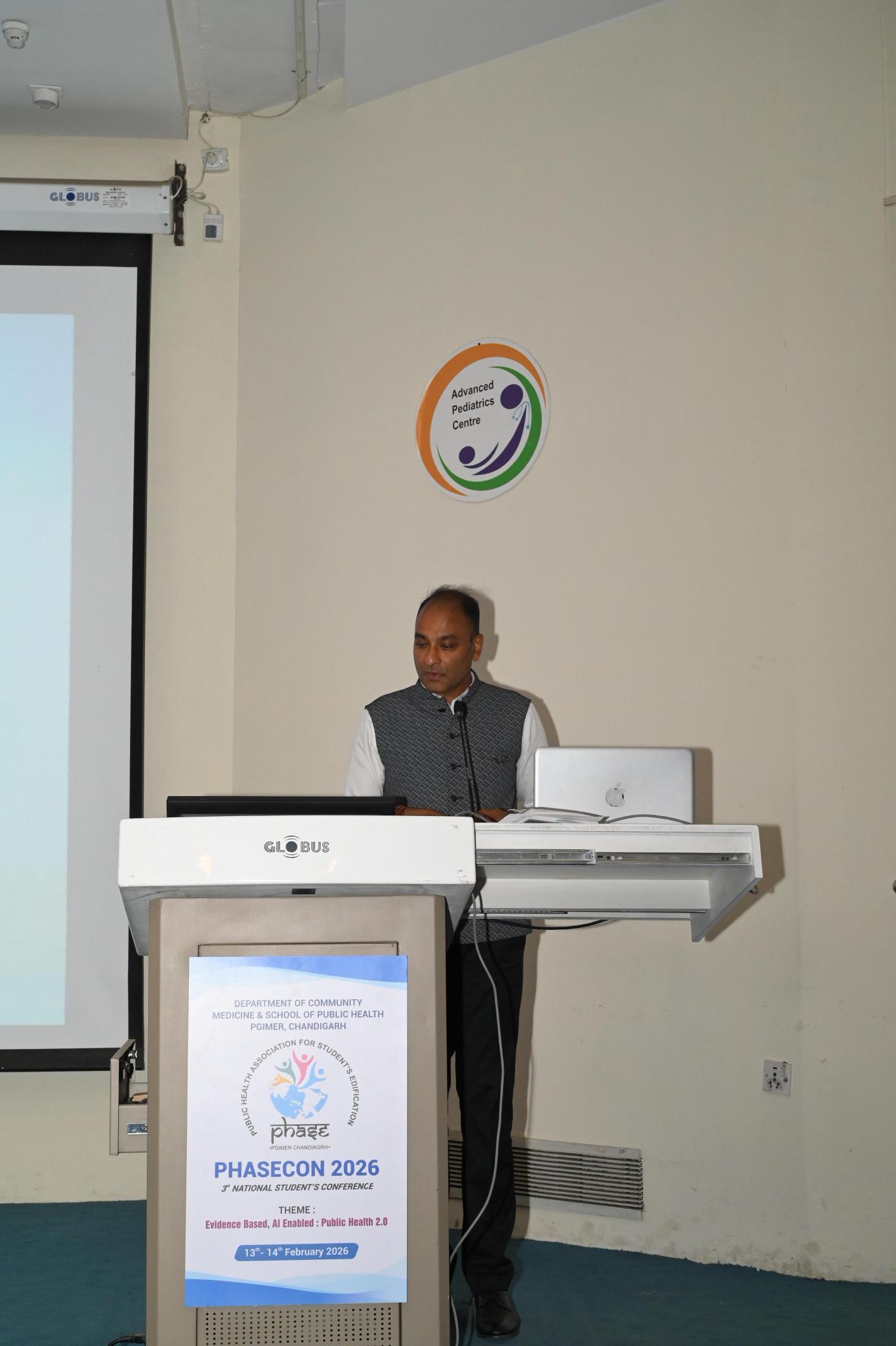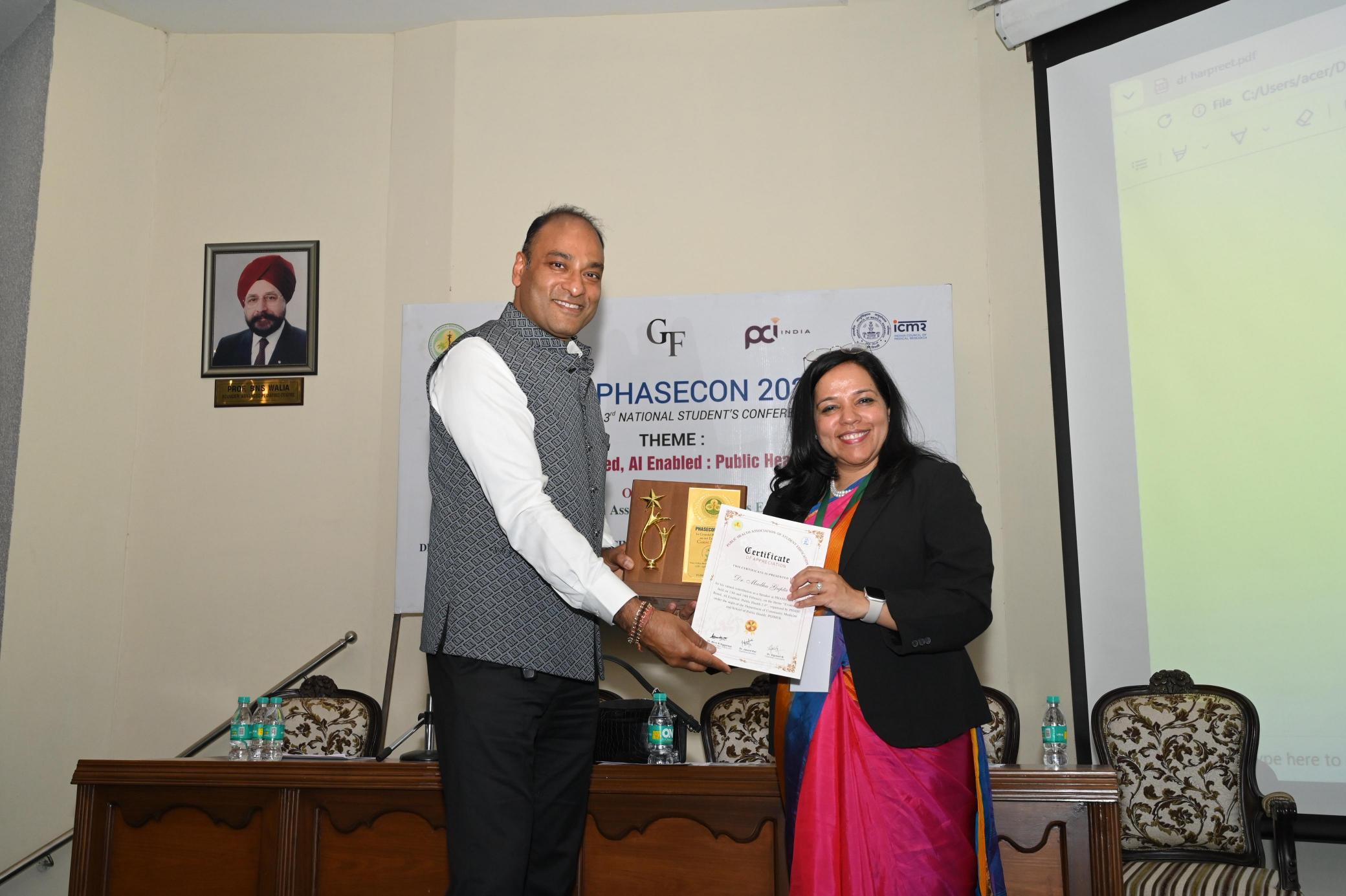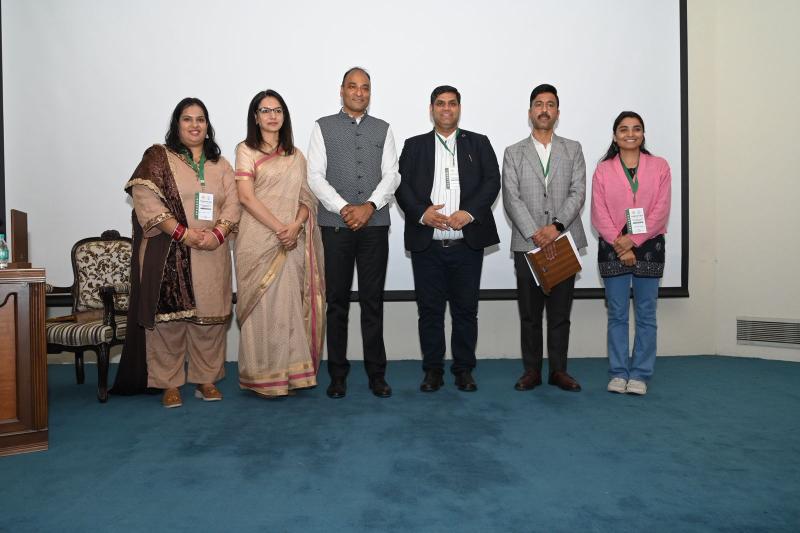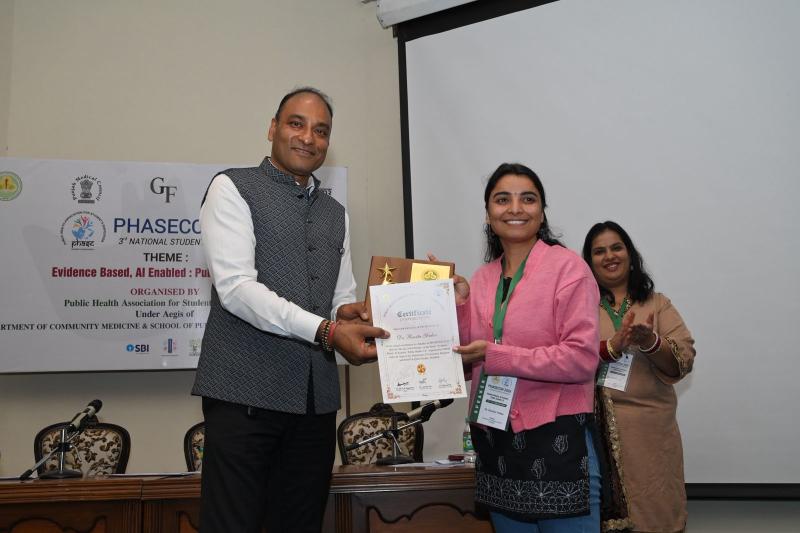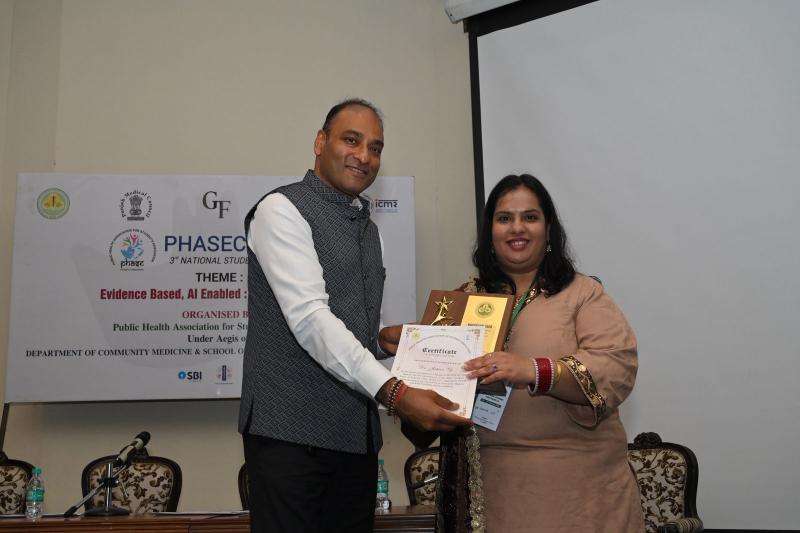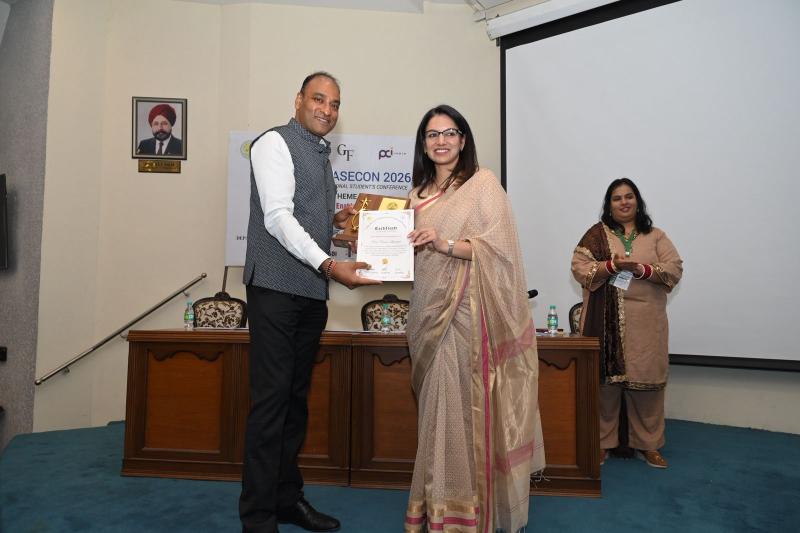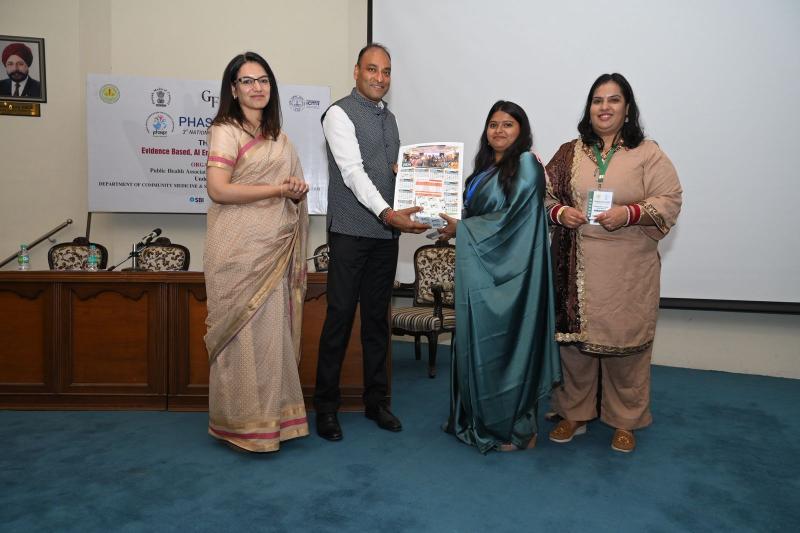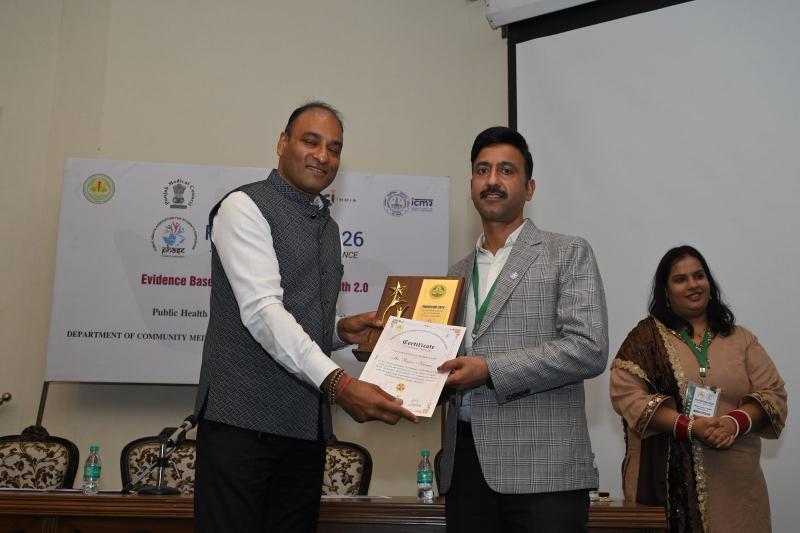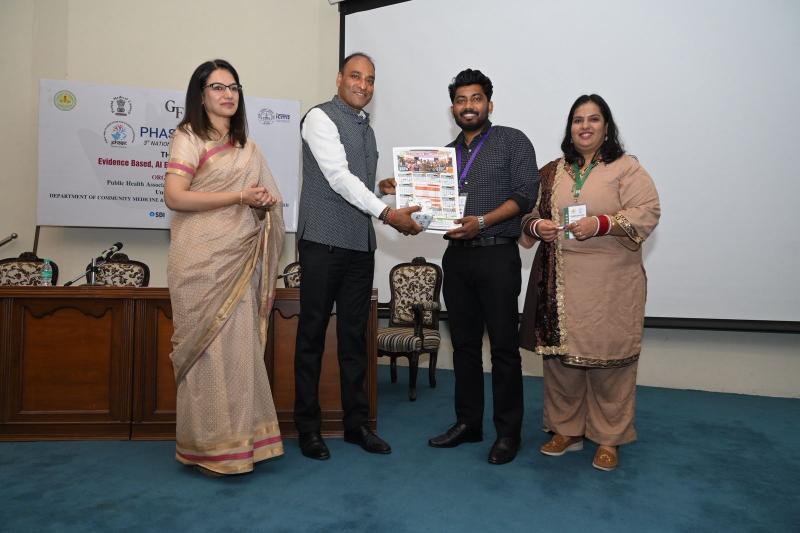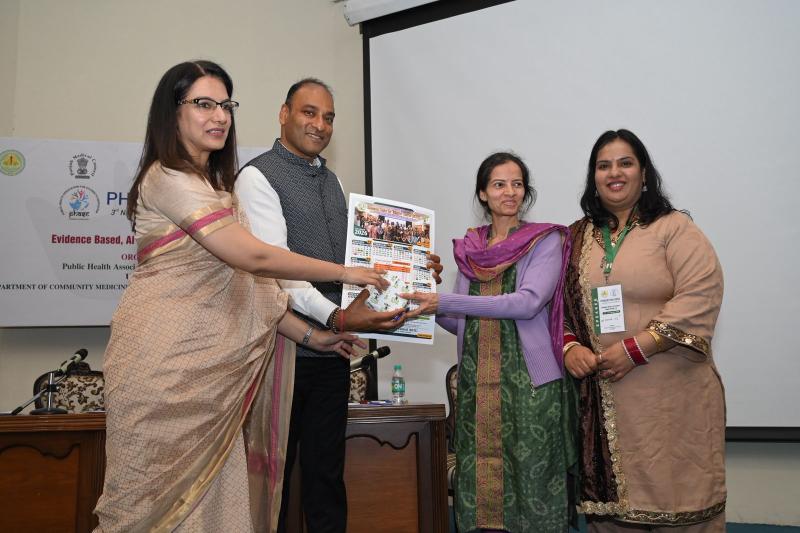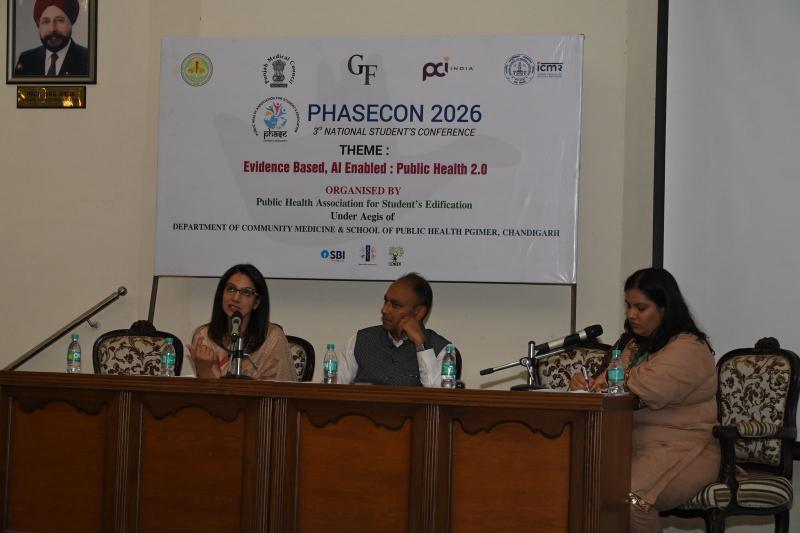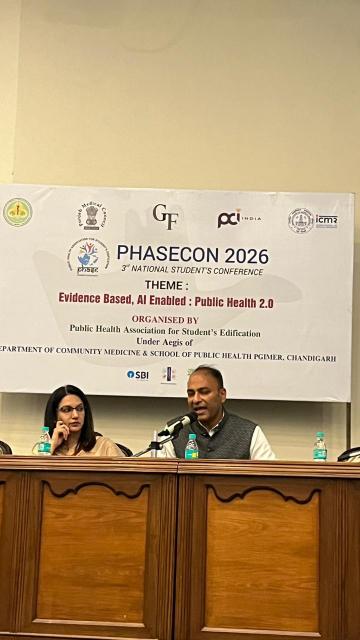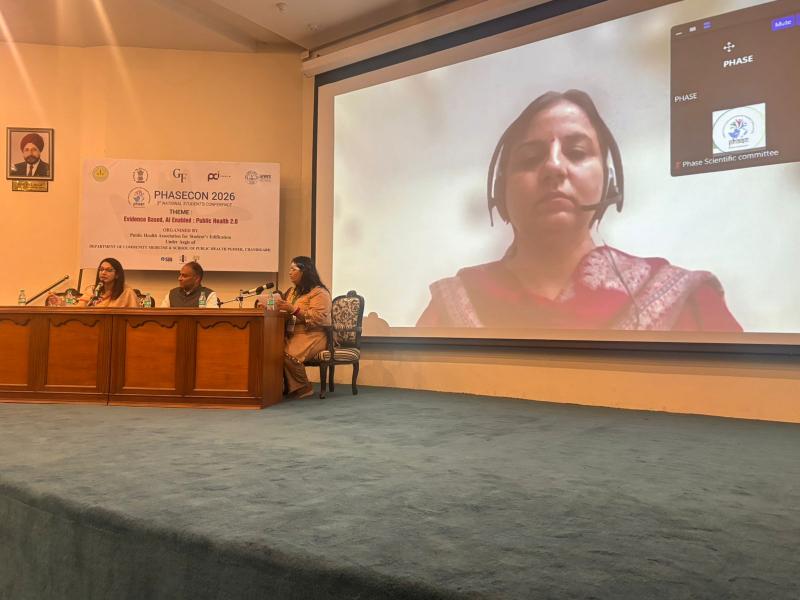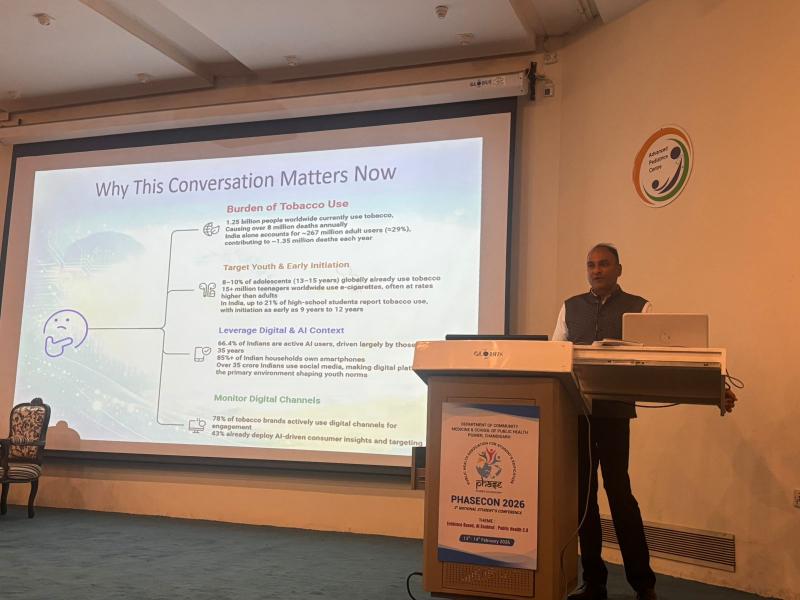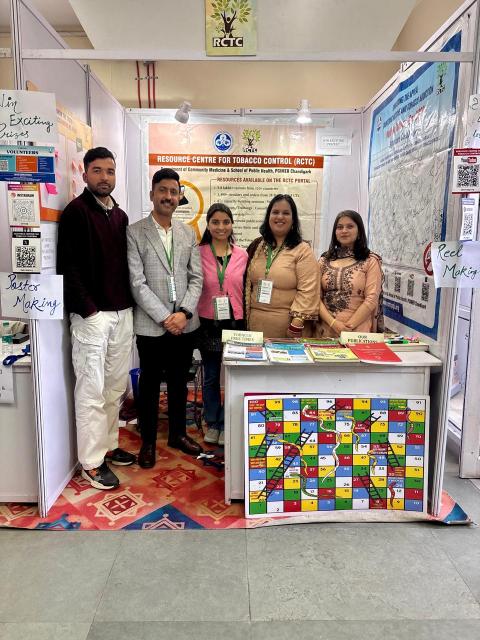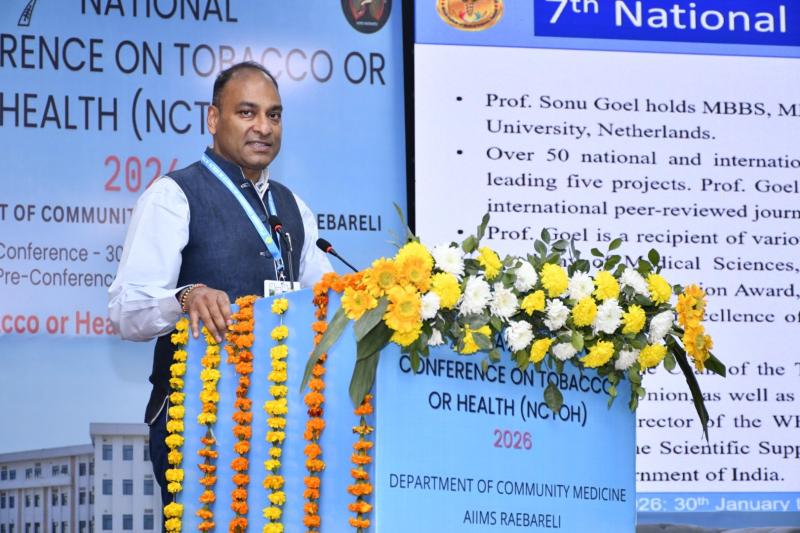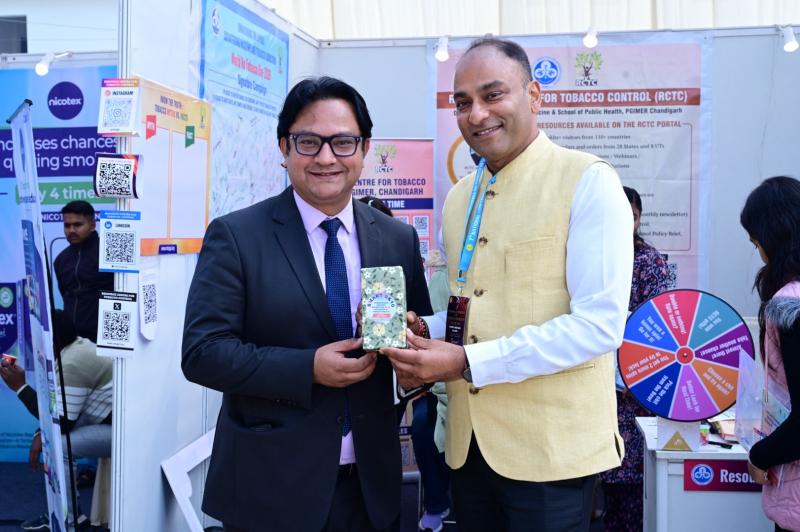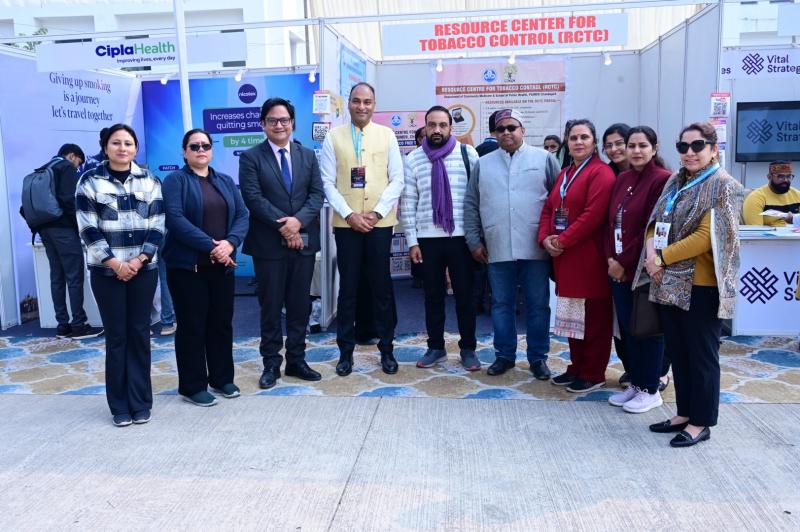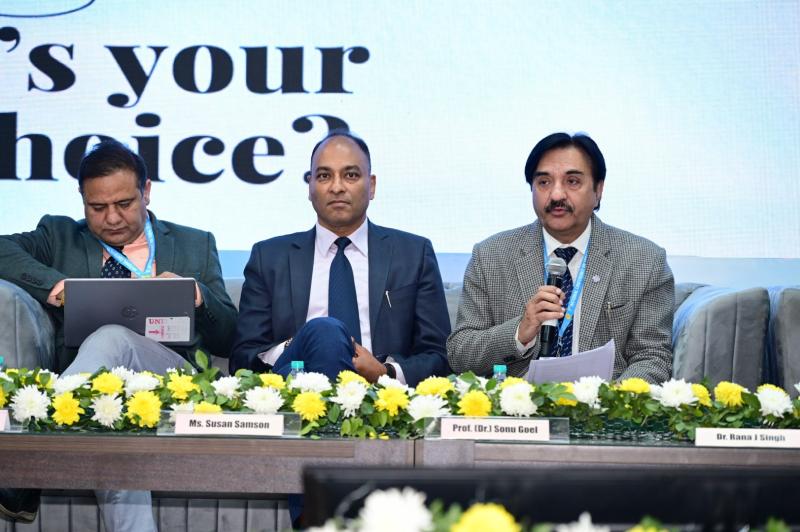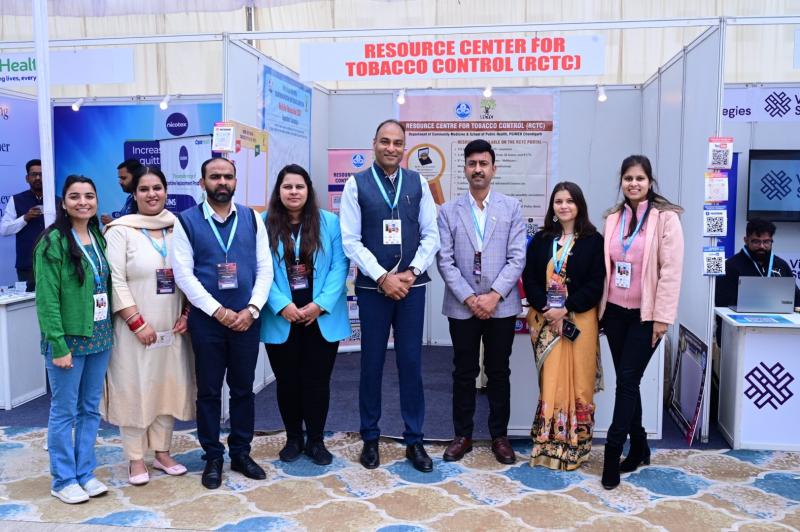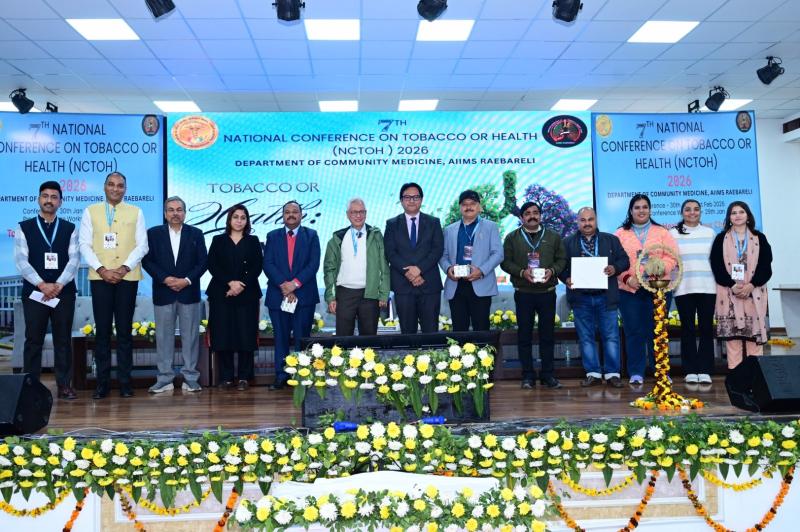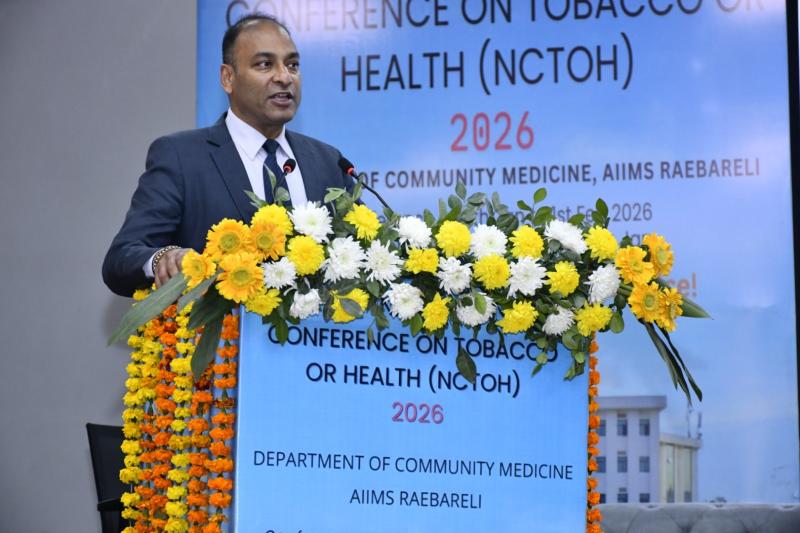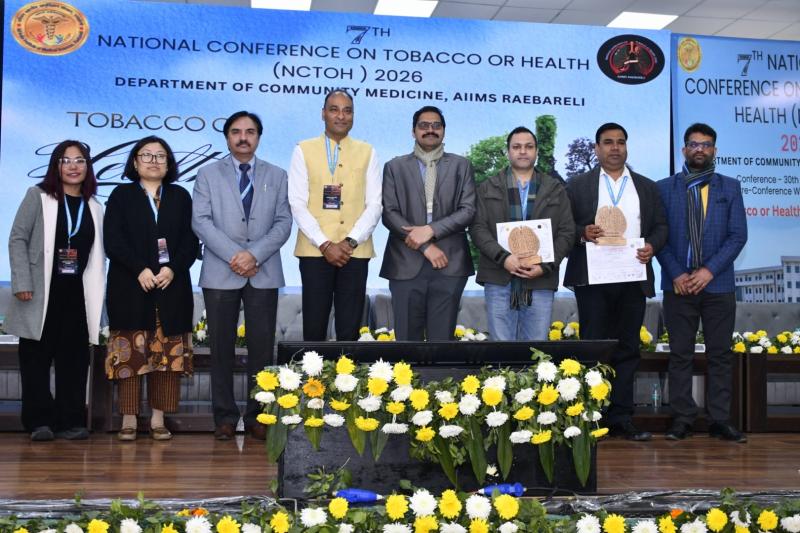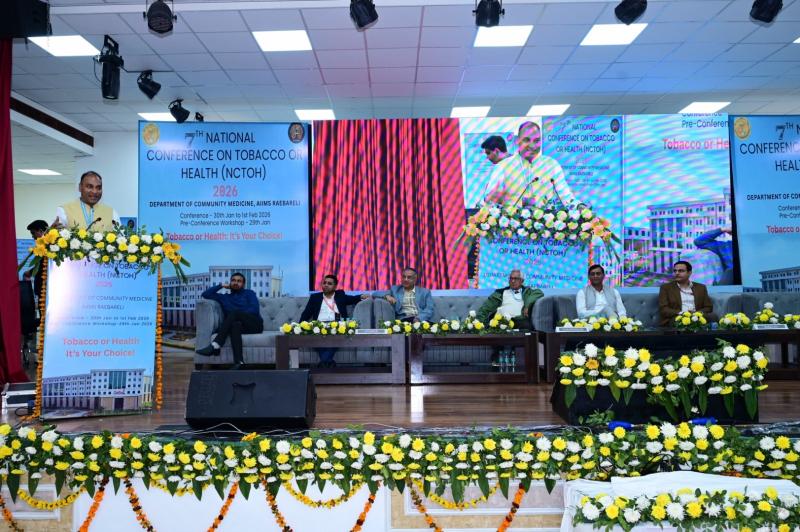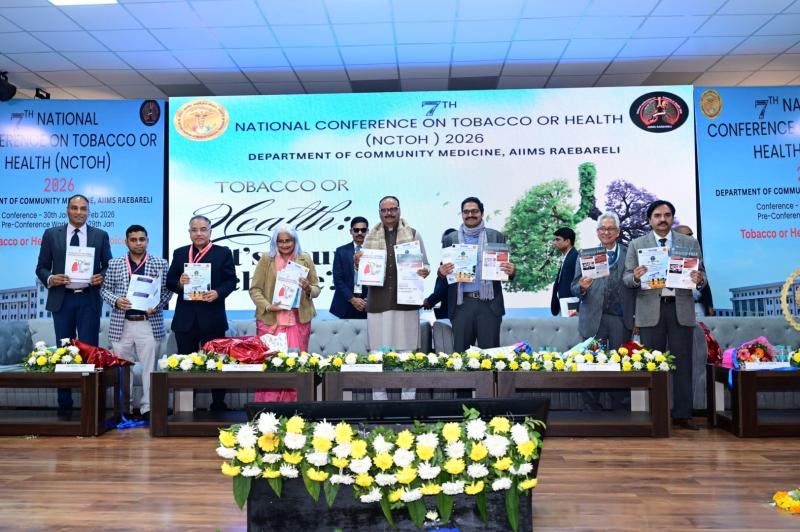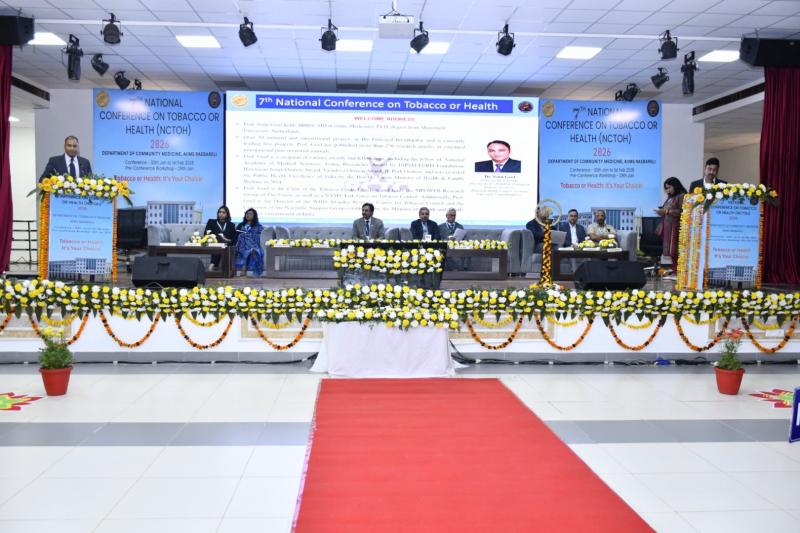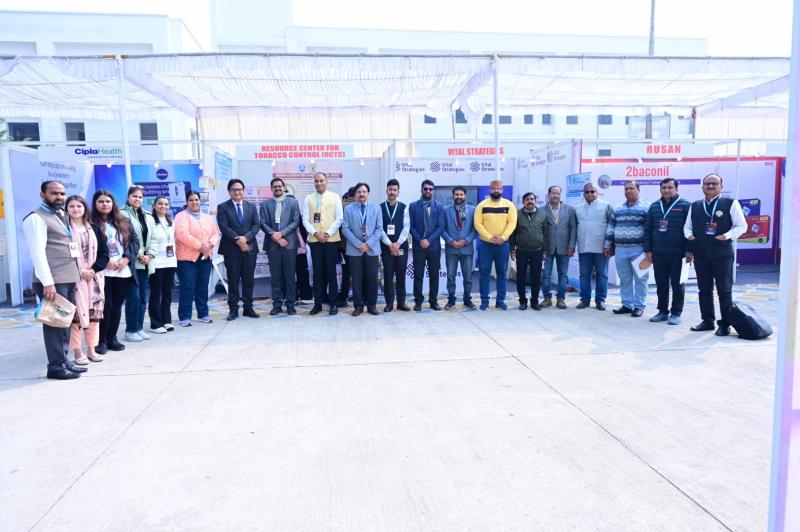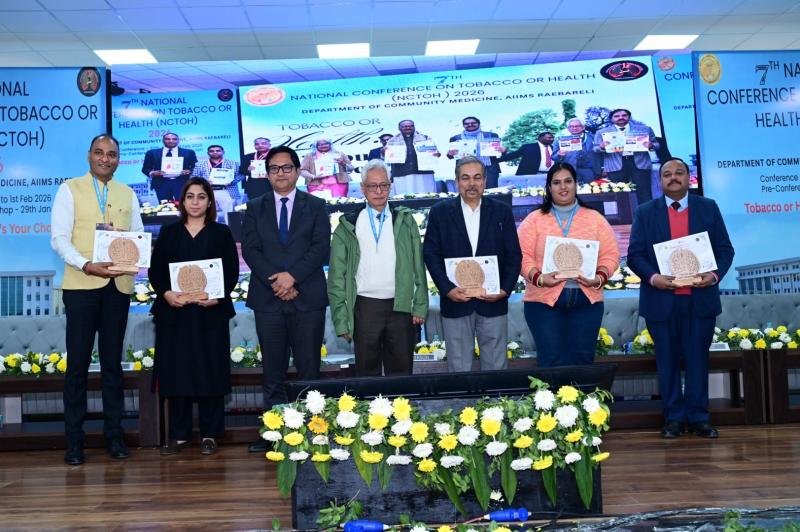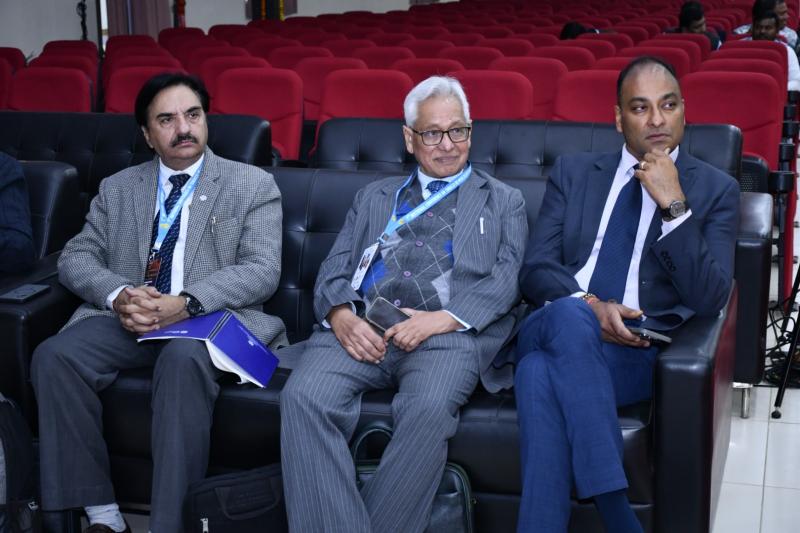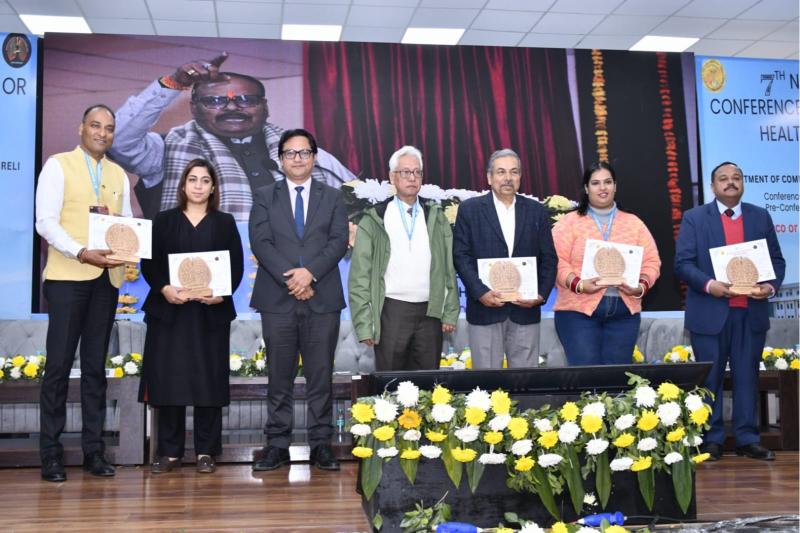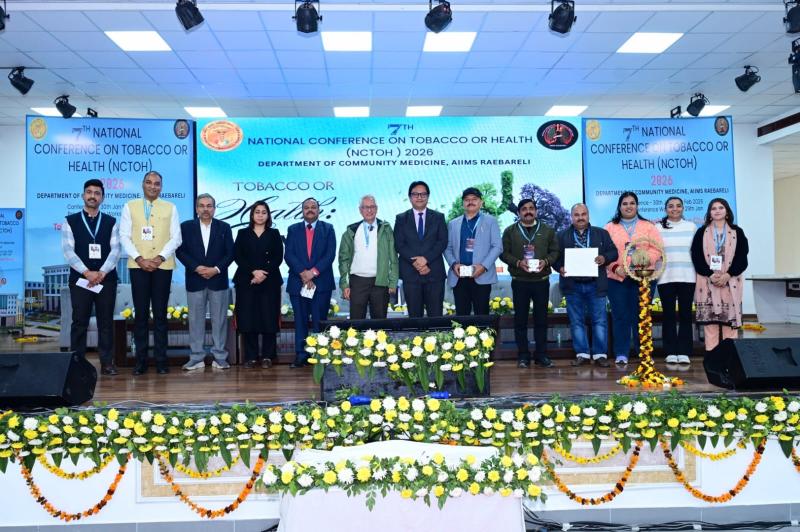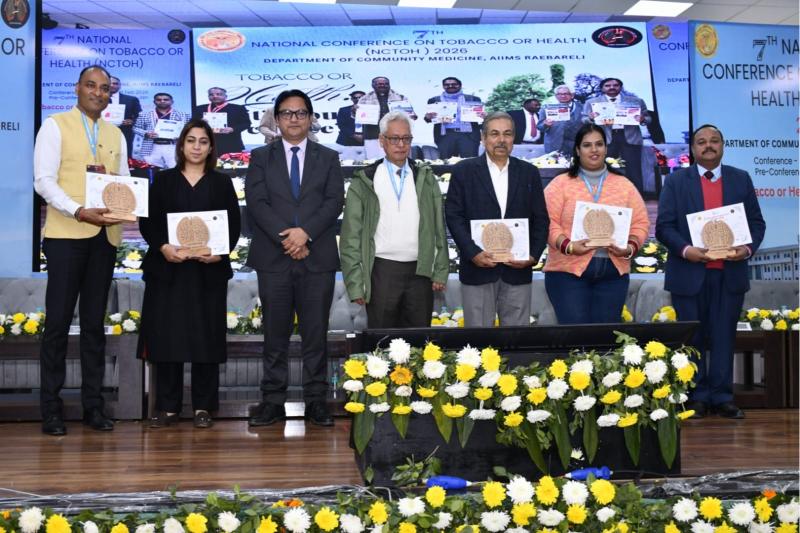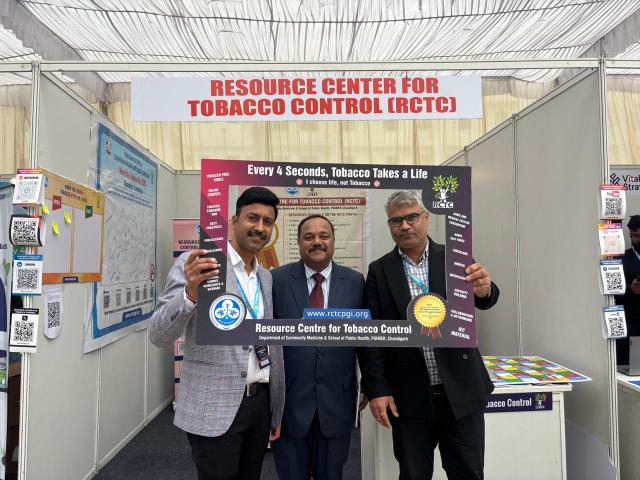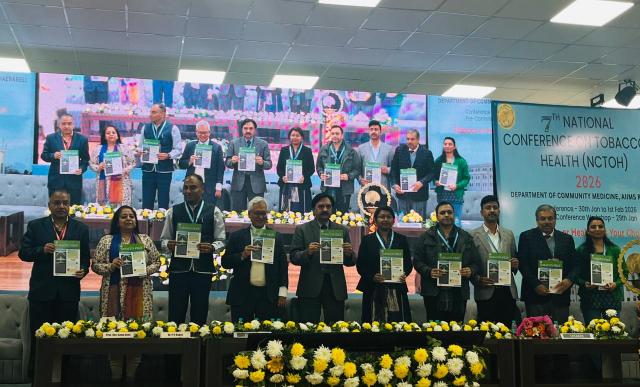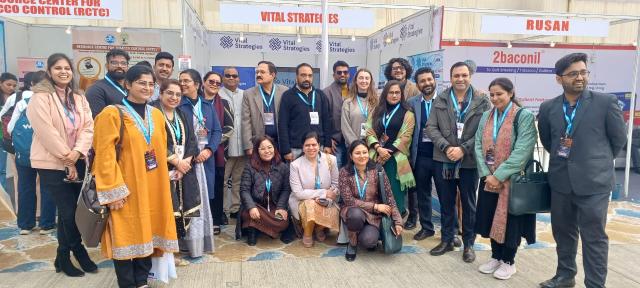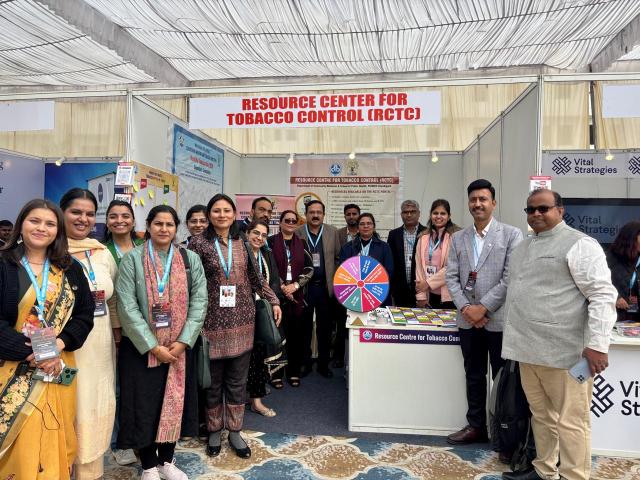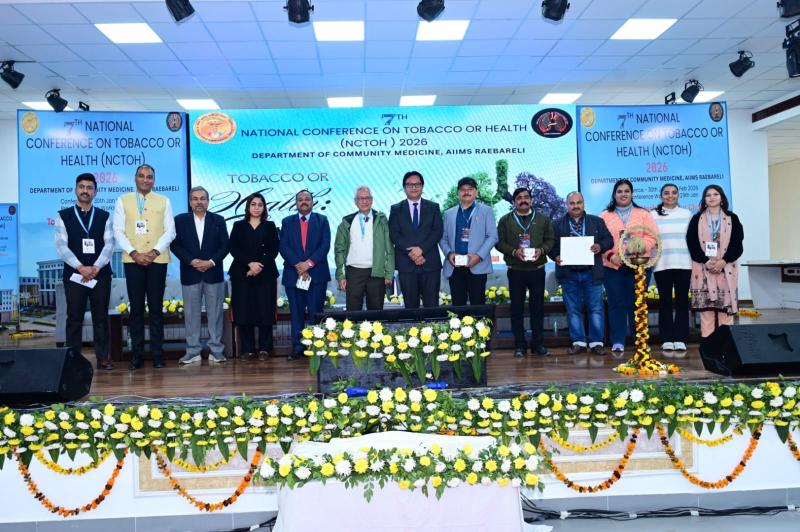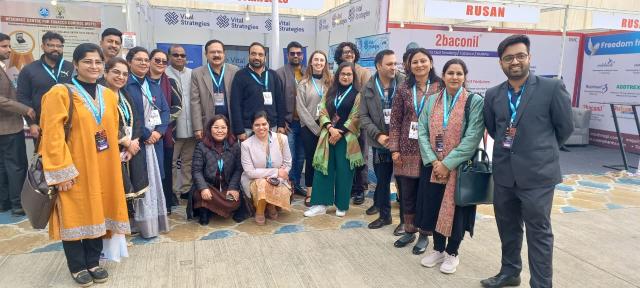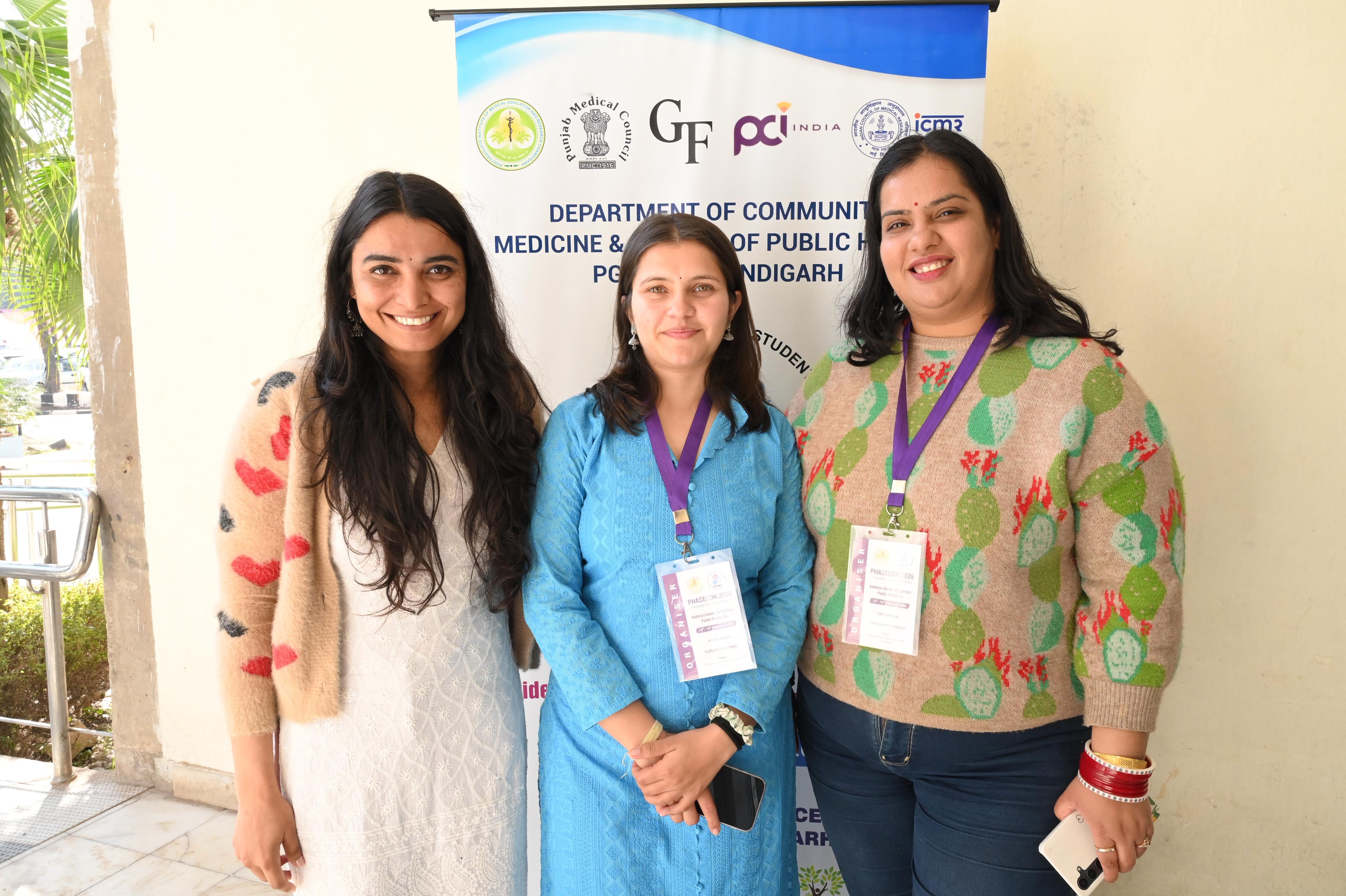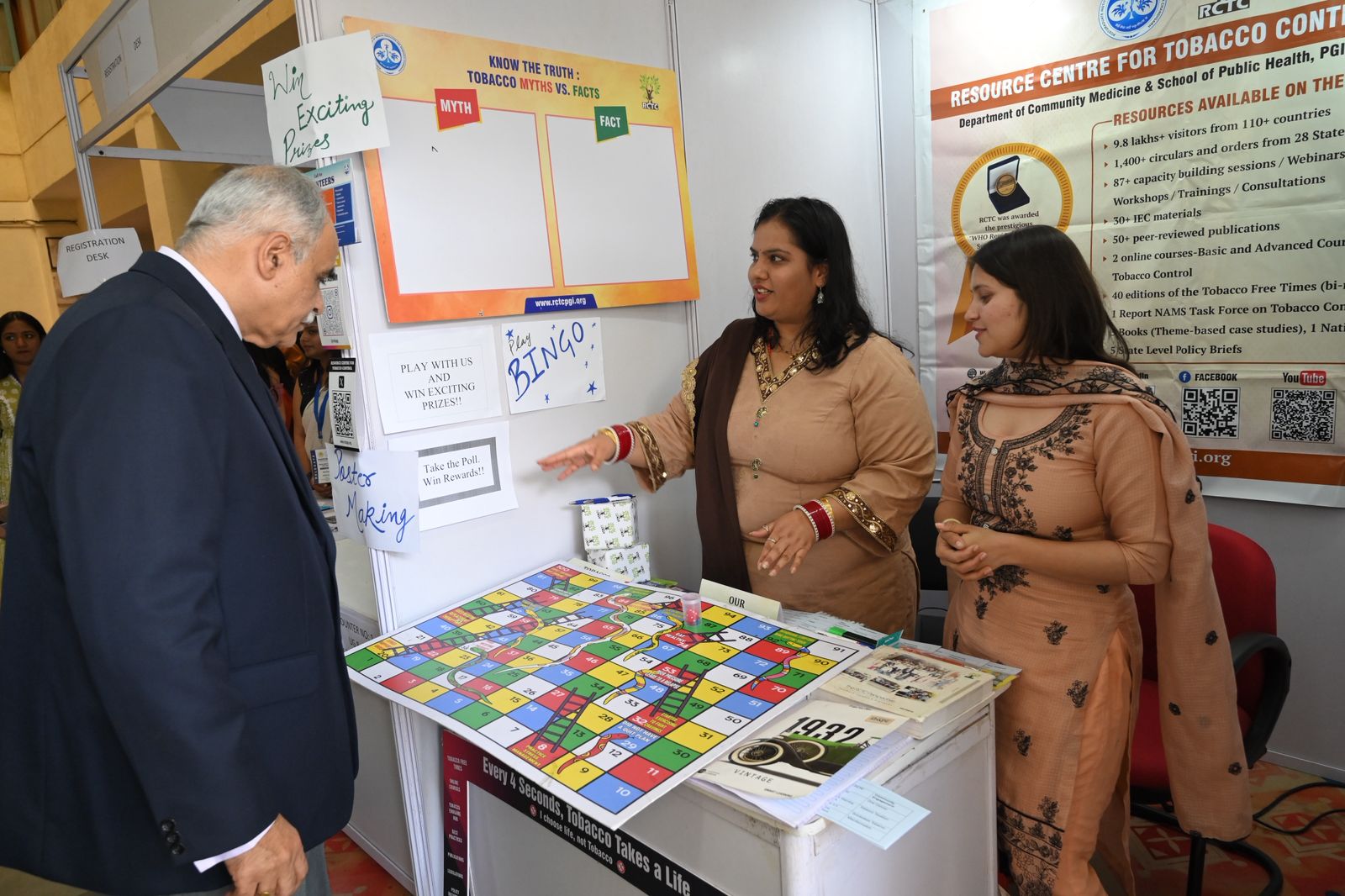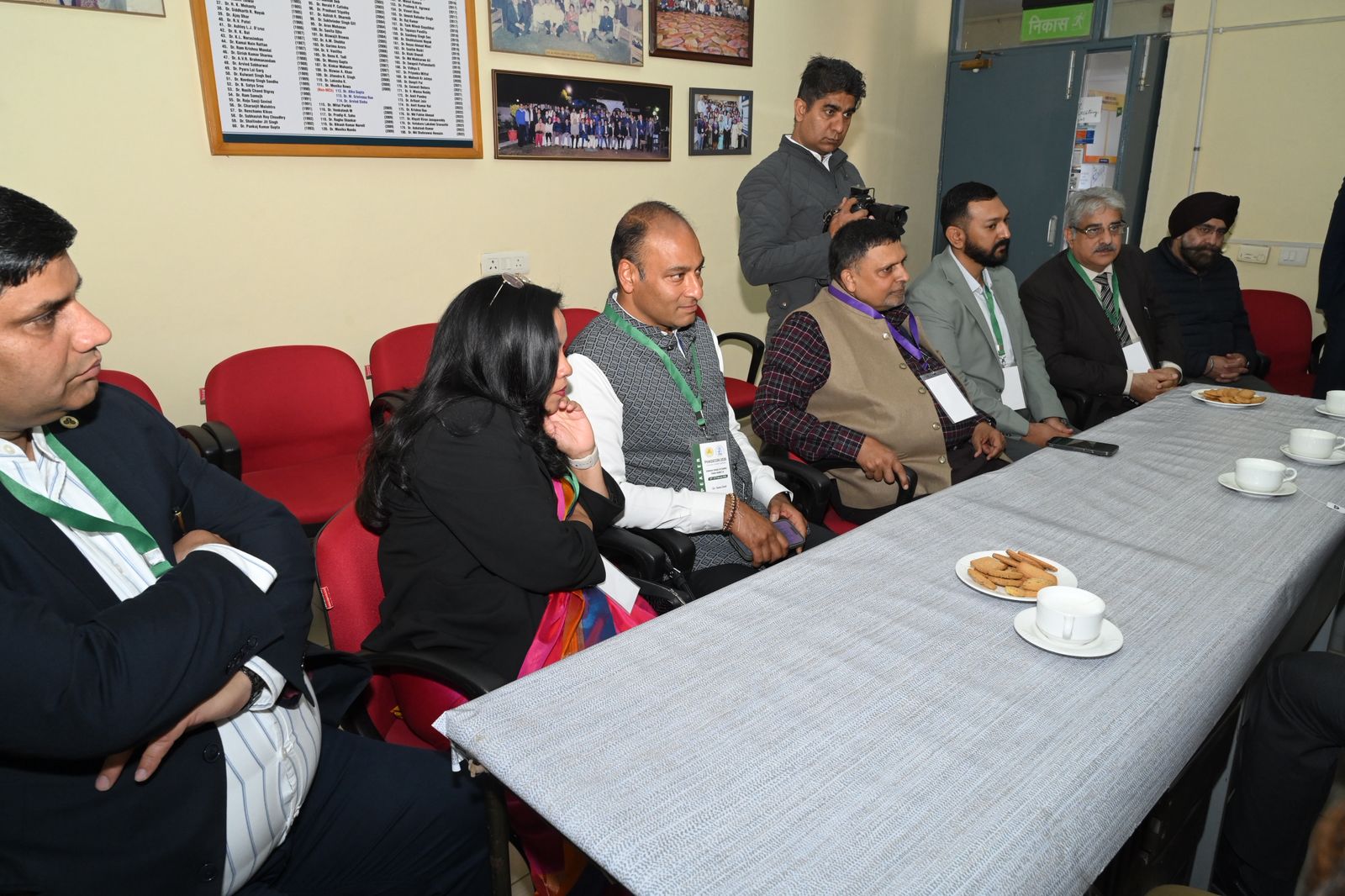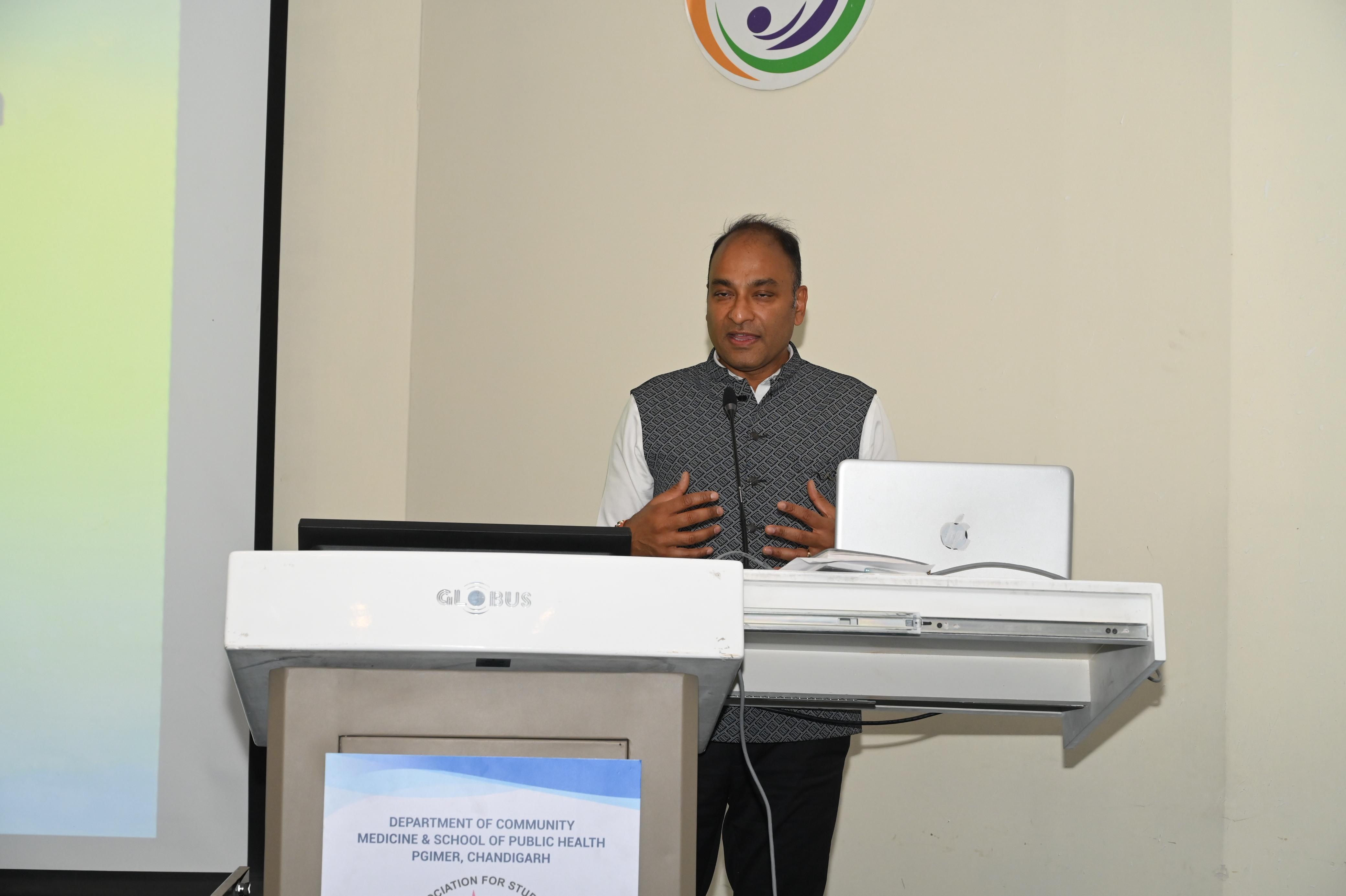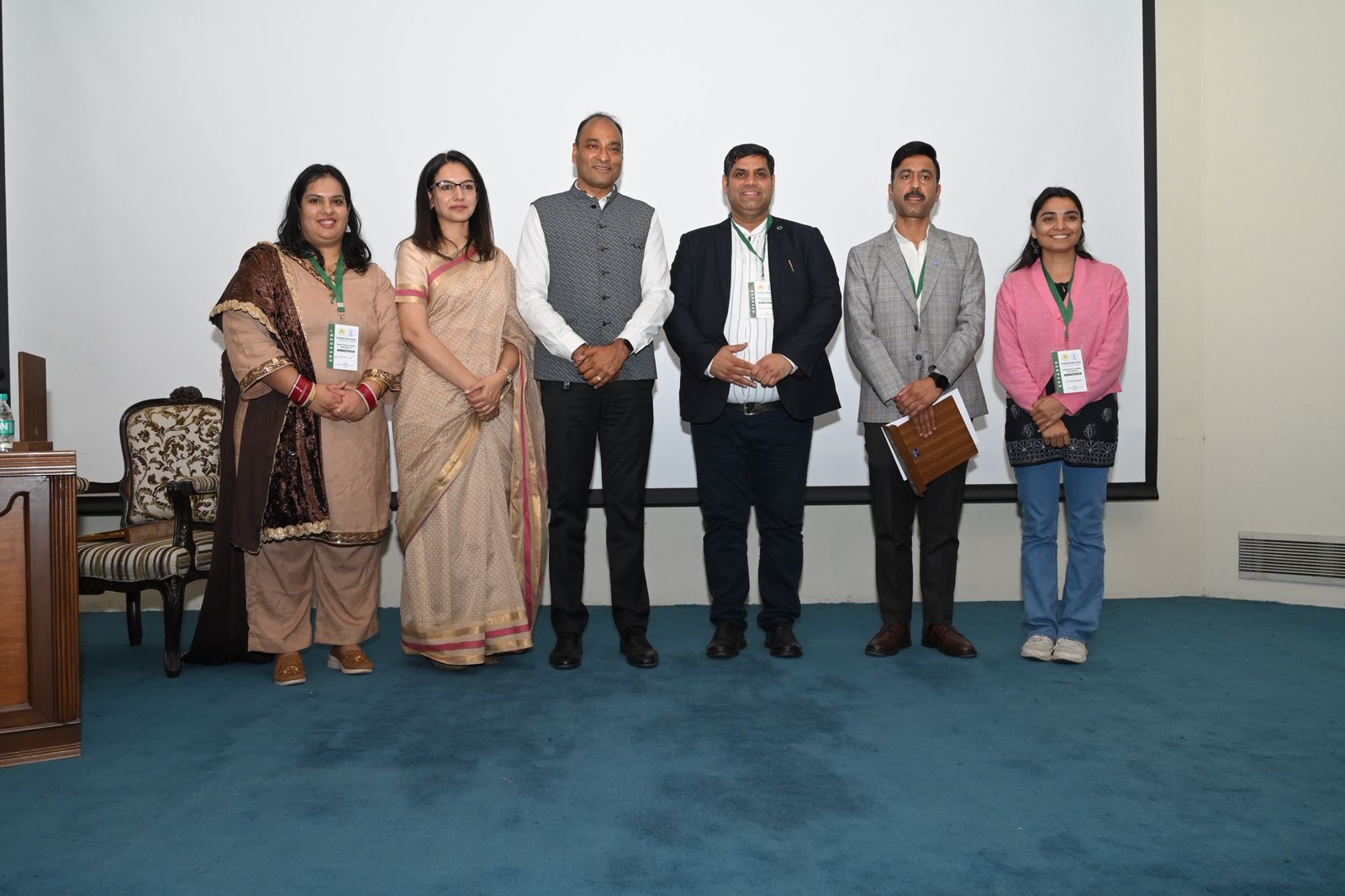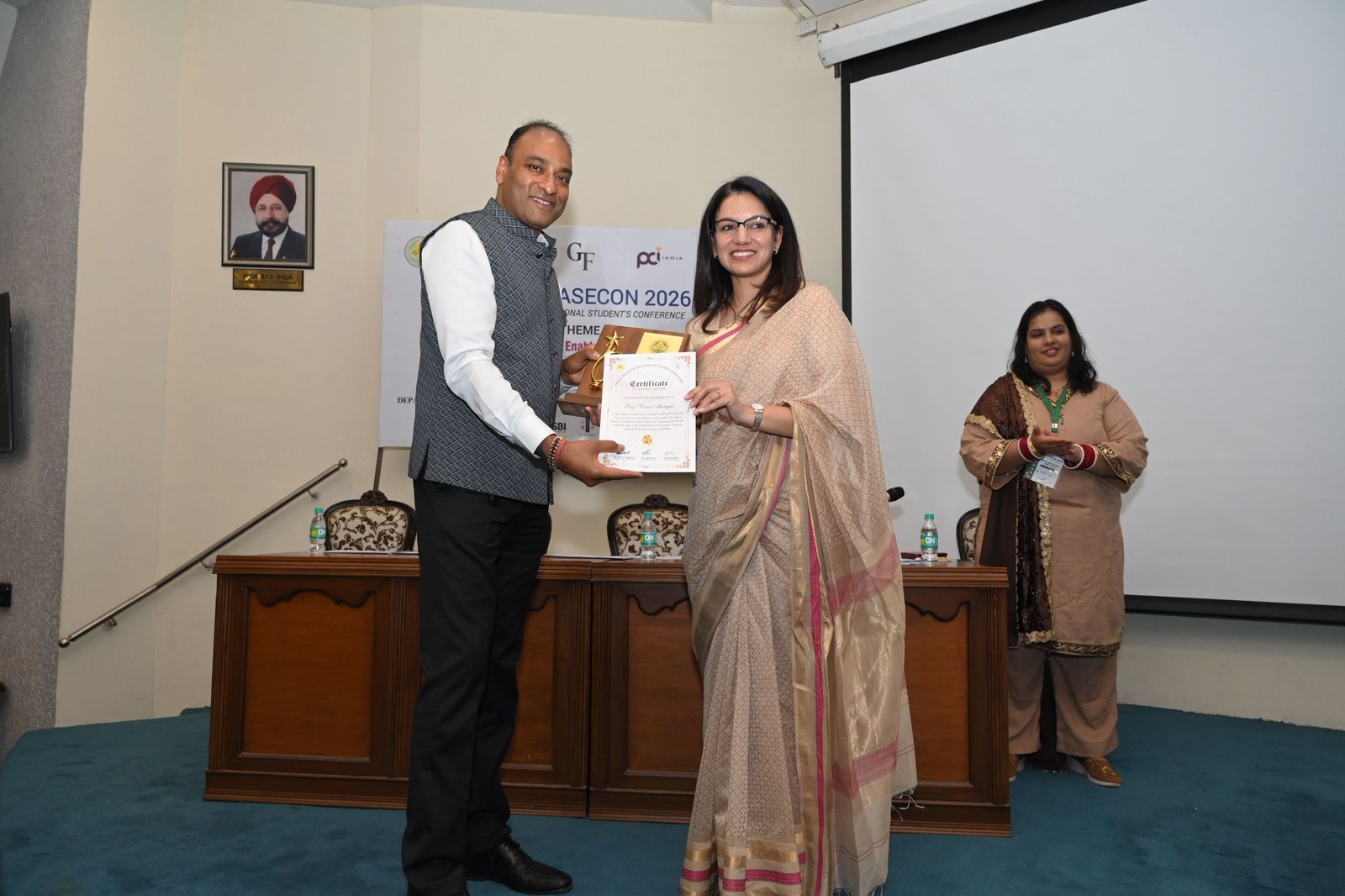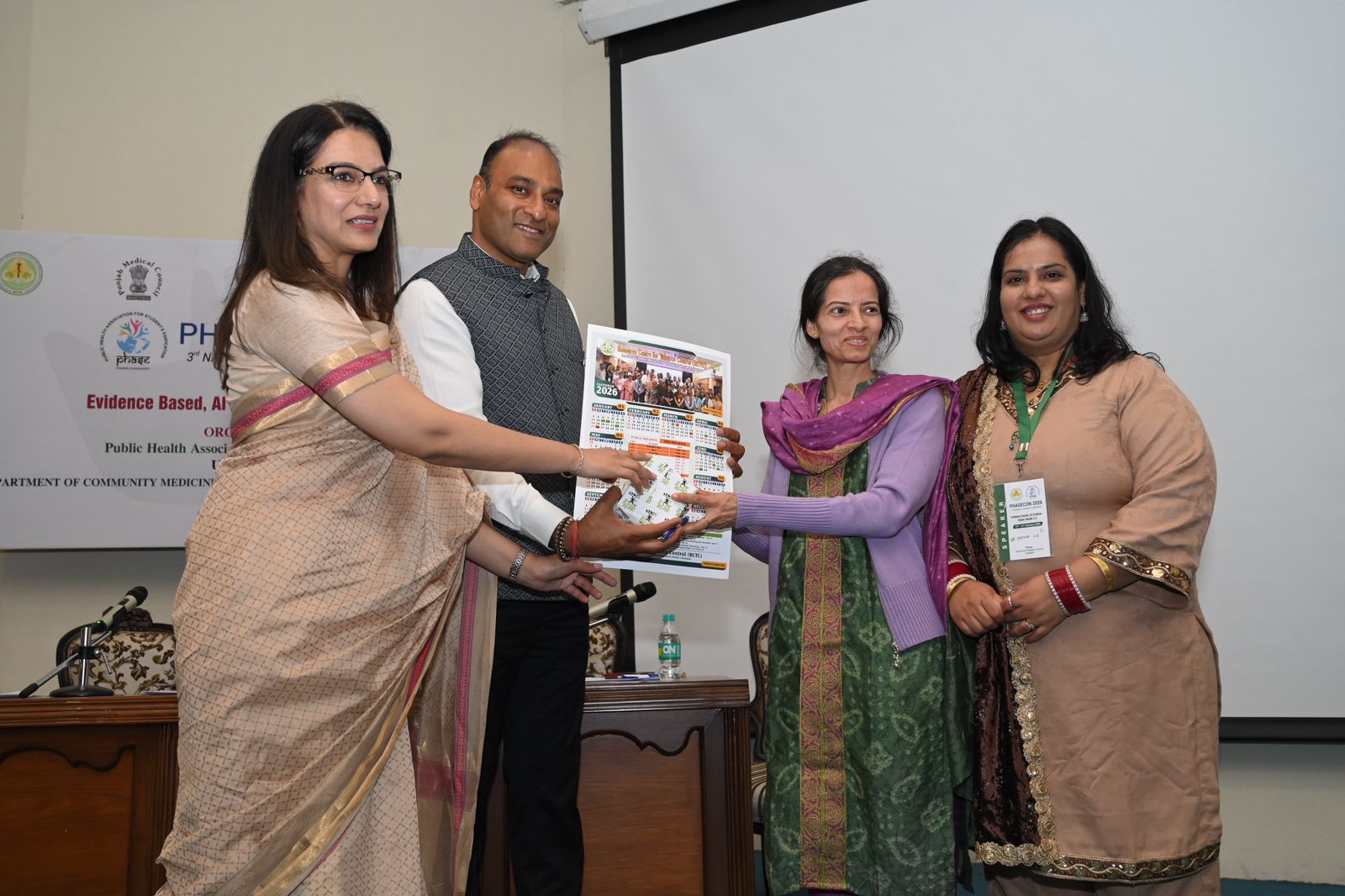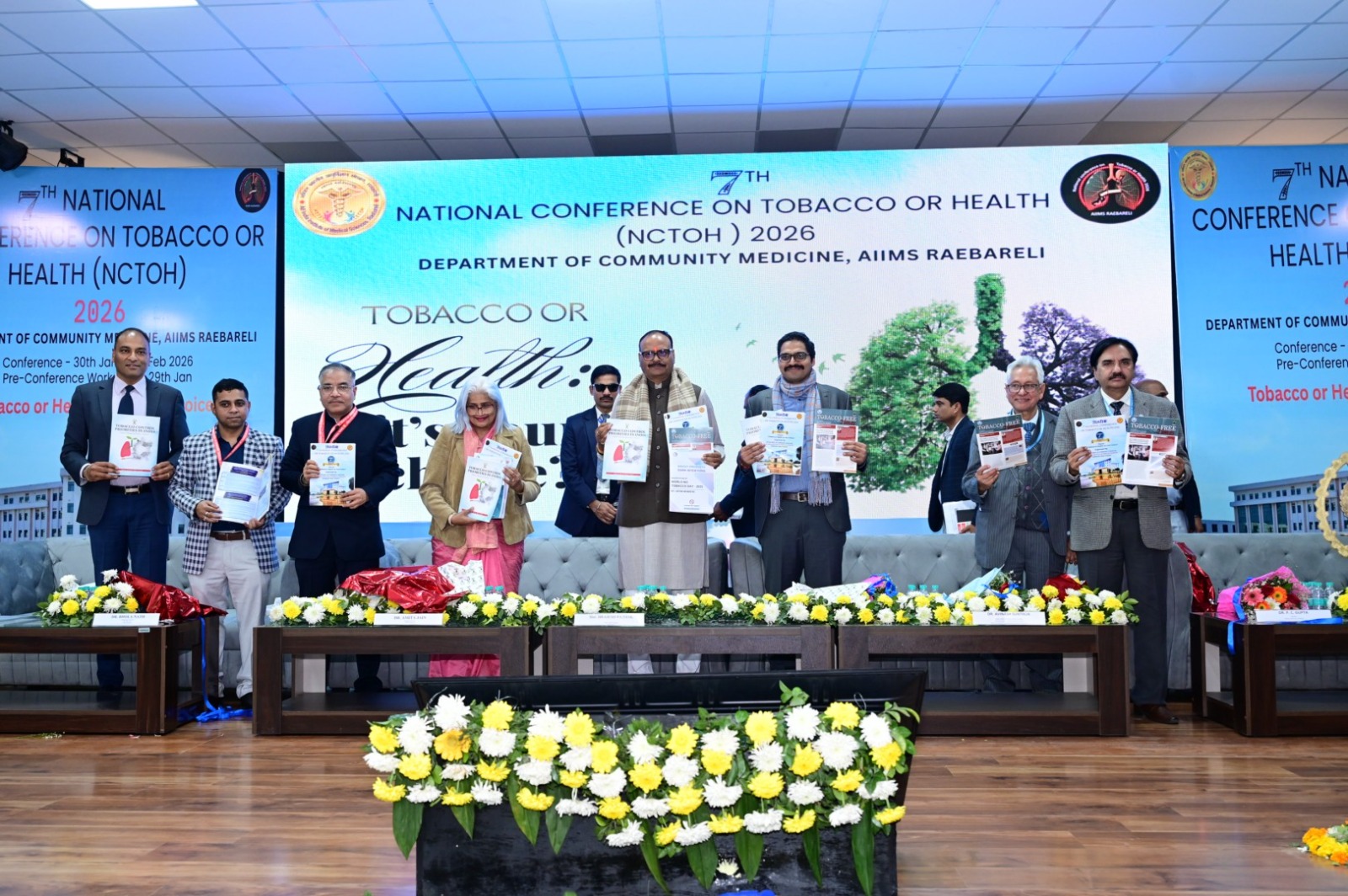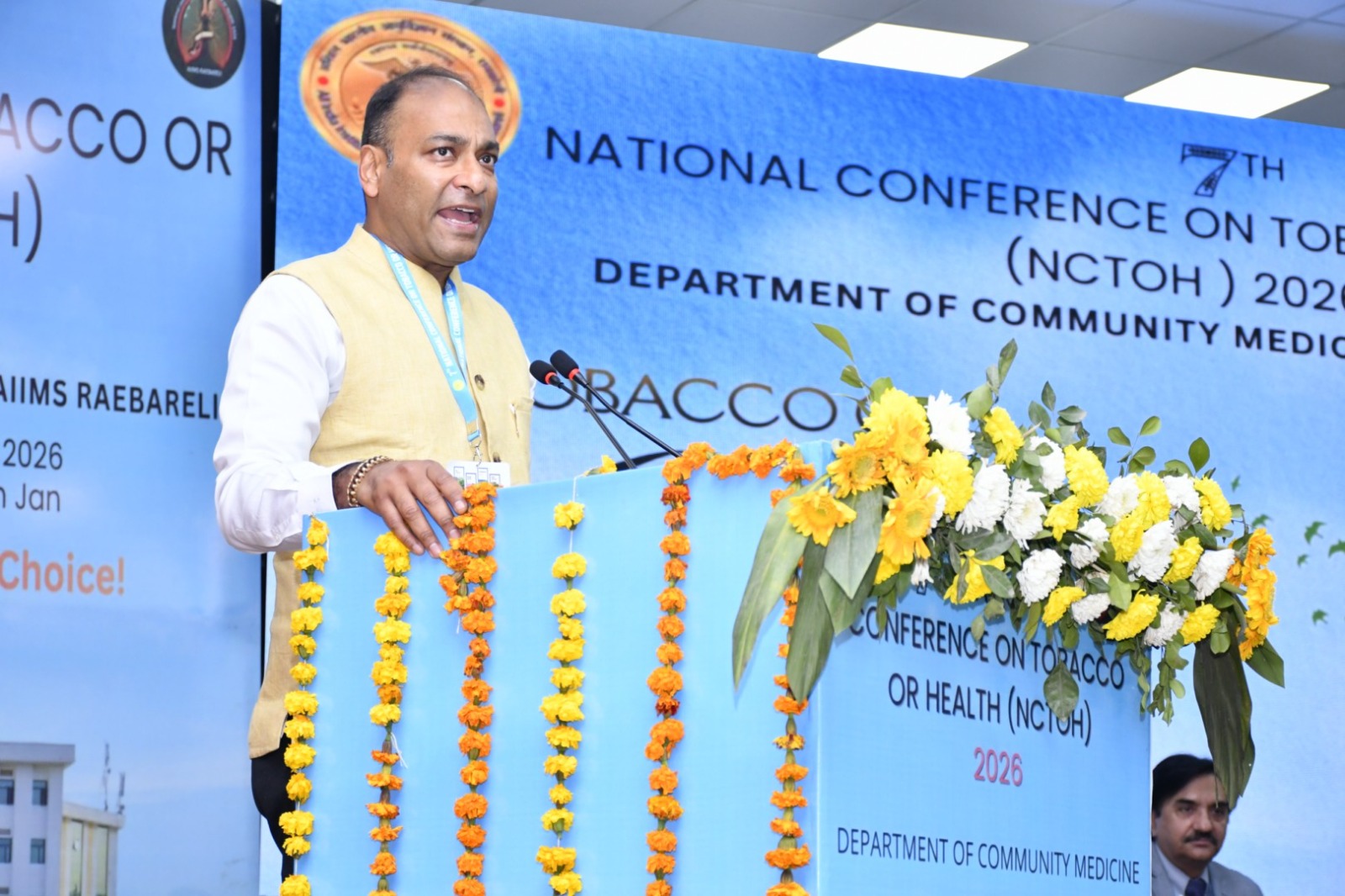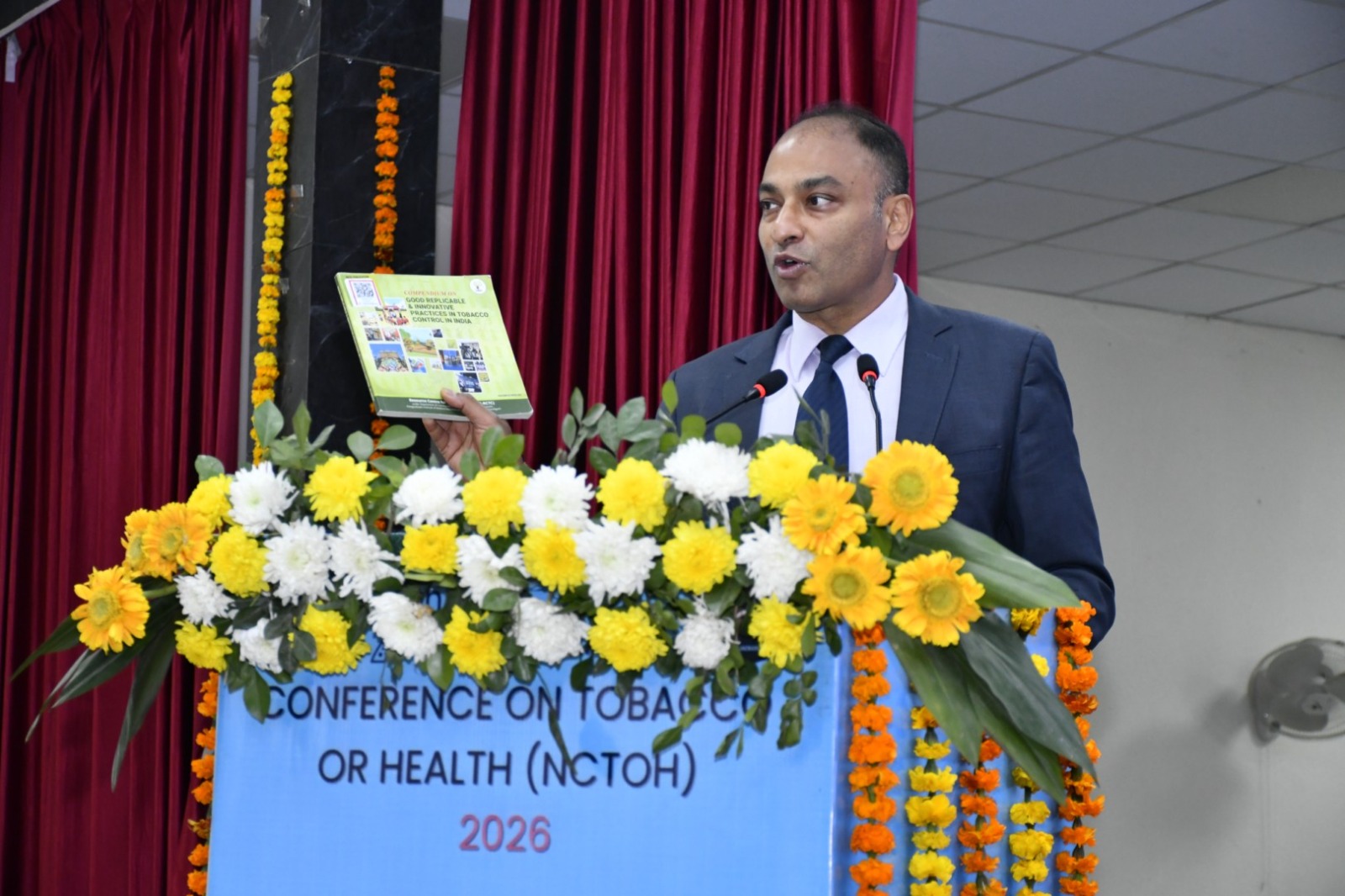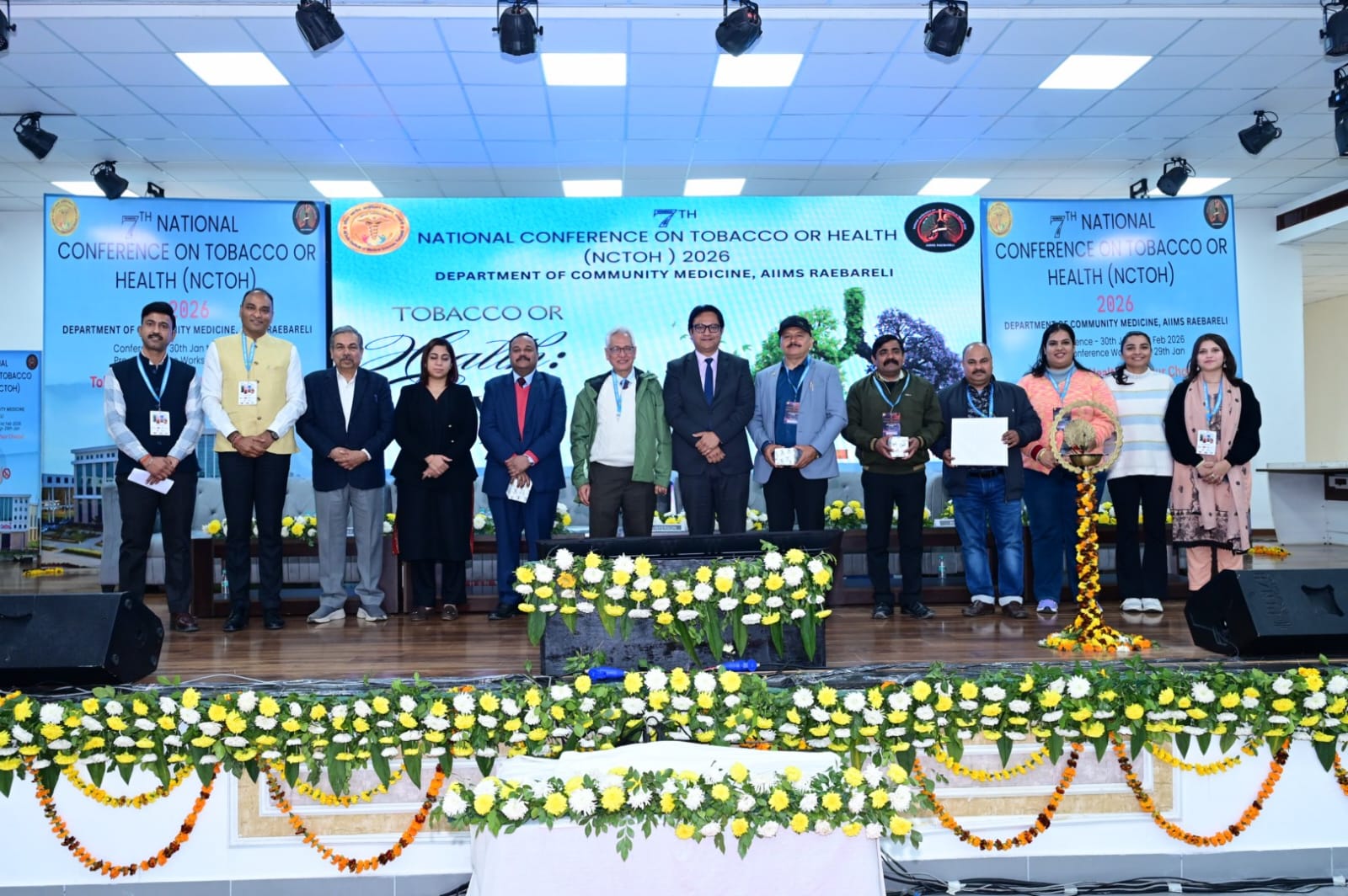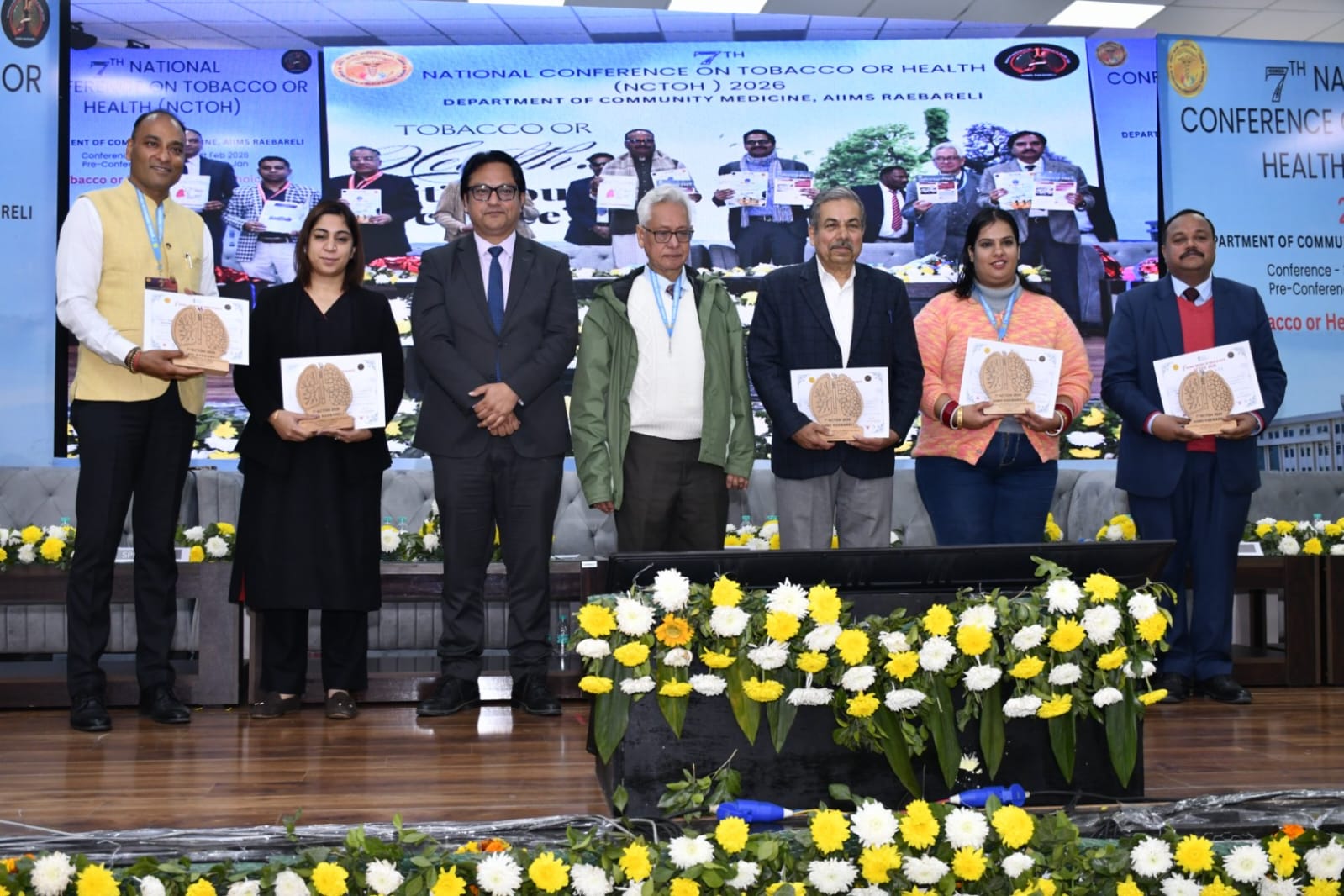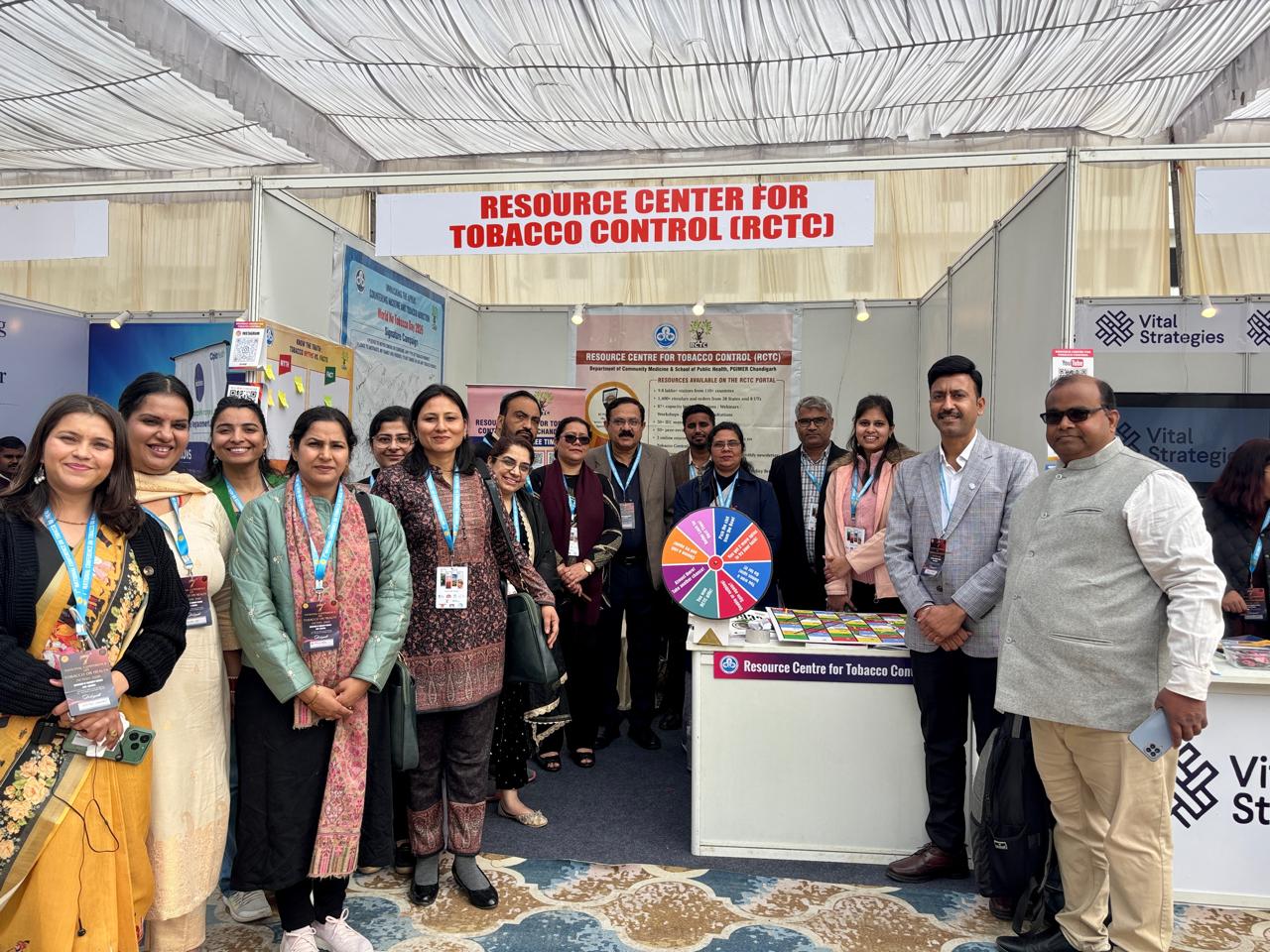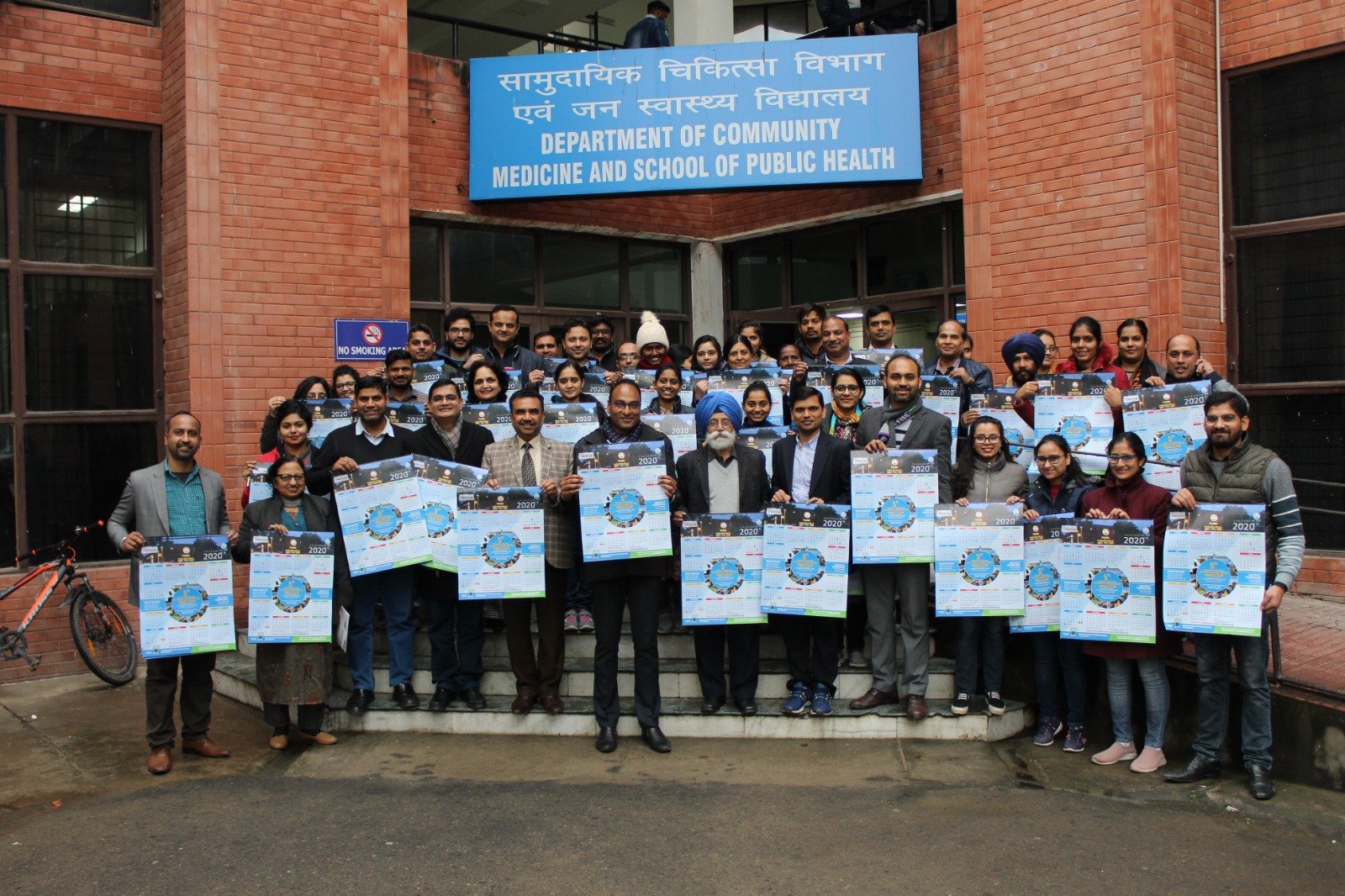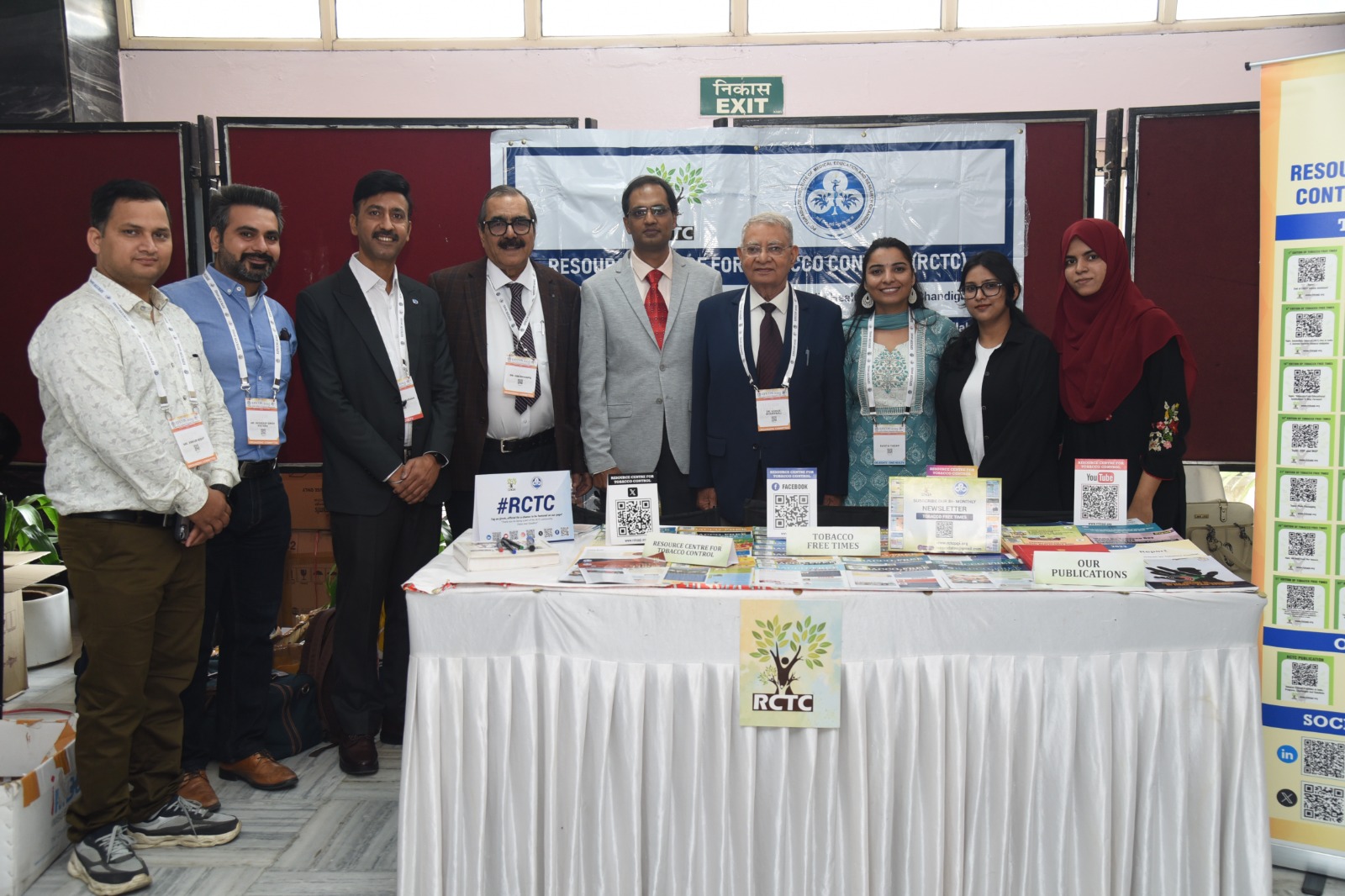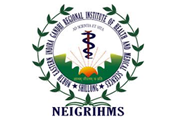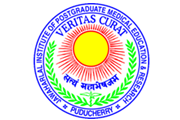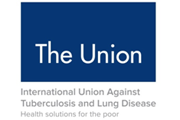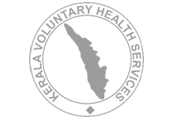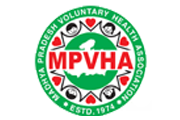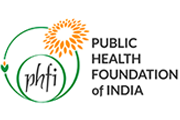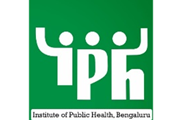About Us
Resource Center For Tobacco Control
RCTC, a joint initiative of PGIMER Chandigarh and The Union, is emerging as one of the most-sought-after platforms that showcases tobacco control initiatives, updates, policies, resource materials etc. from the length and breadth of the country. It has helped in strengthening National Control Tobacco Programme (NTCP) to a great extent.
Further, this online hub contains latest notifications and circulars by national and state government's related to effective implementation of NTCP. RCTC compiles and channelizes the correct and reliable information, and then disseminates it from one source.

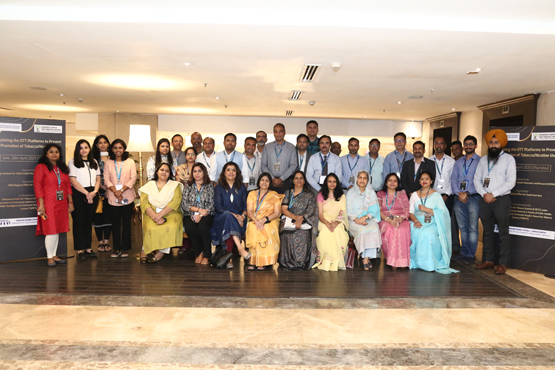

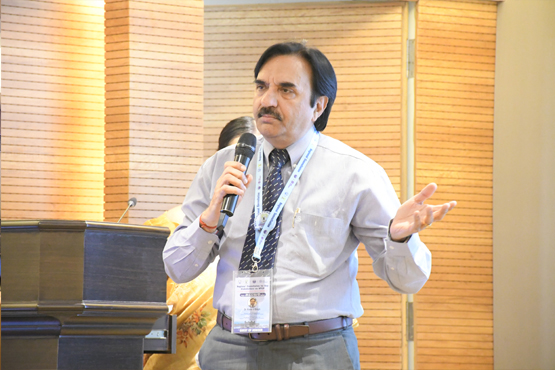
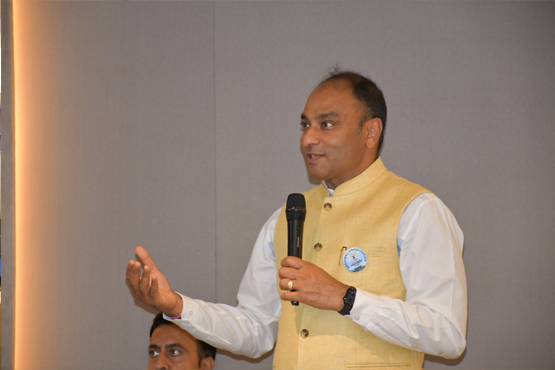
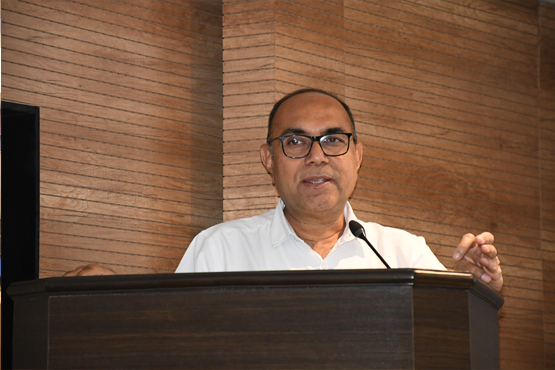
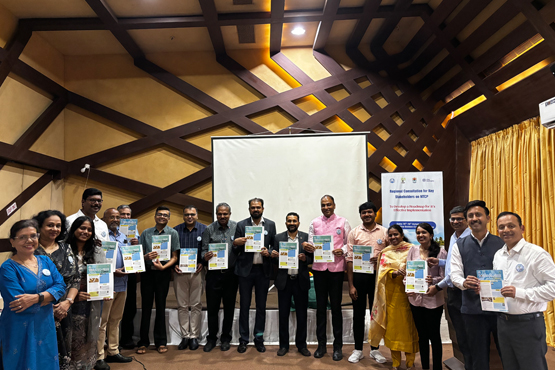

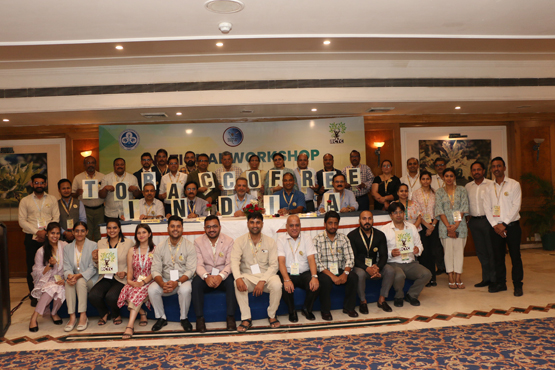

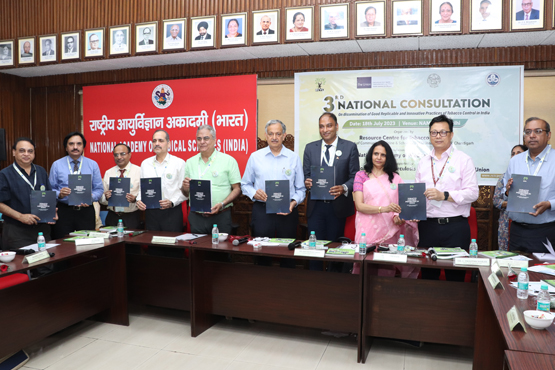
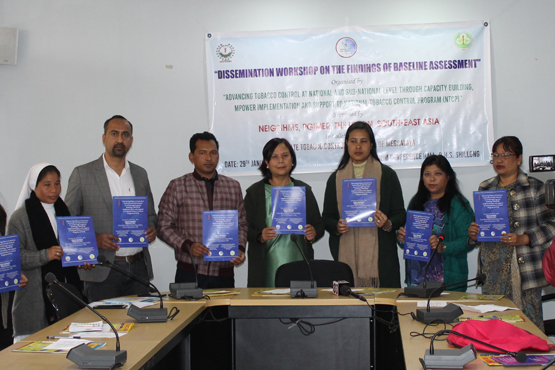

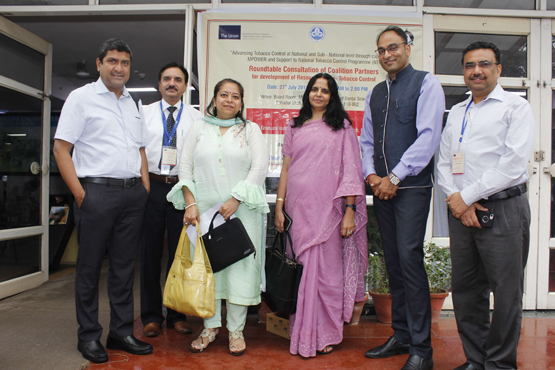

Project Activities Archive
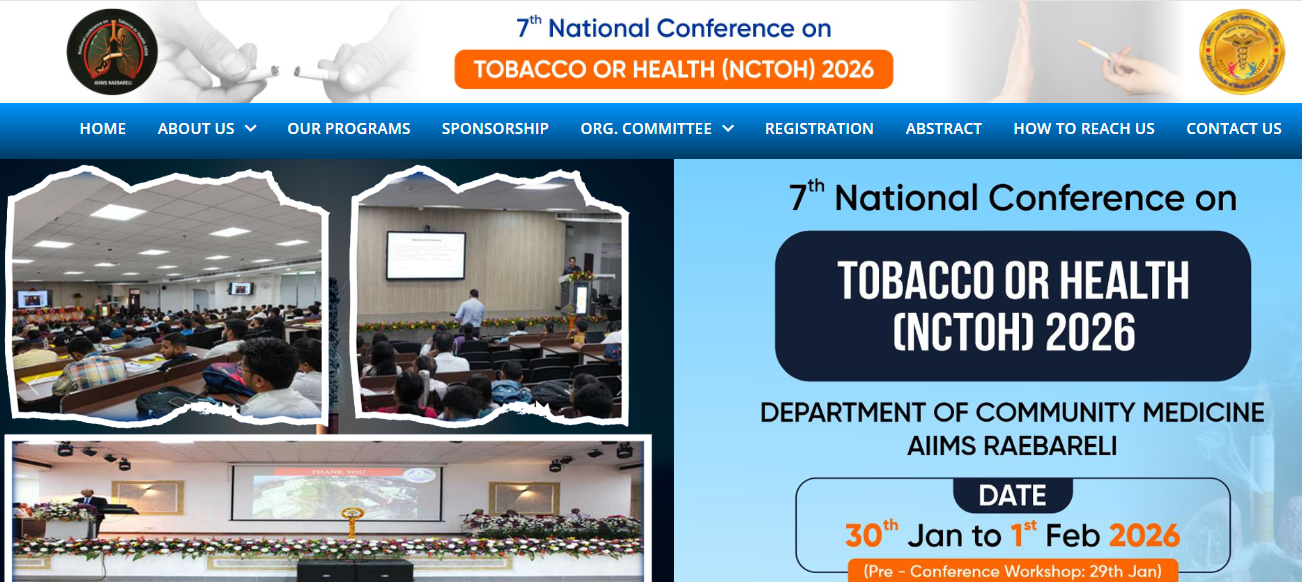
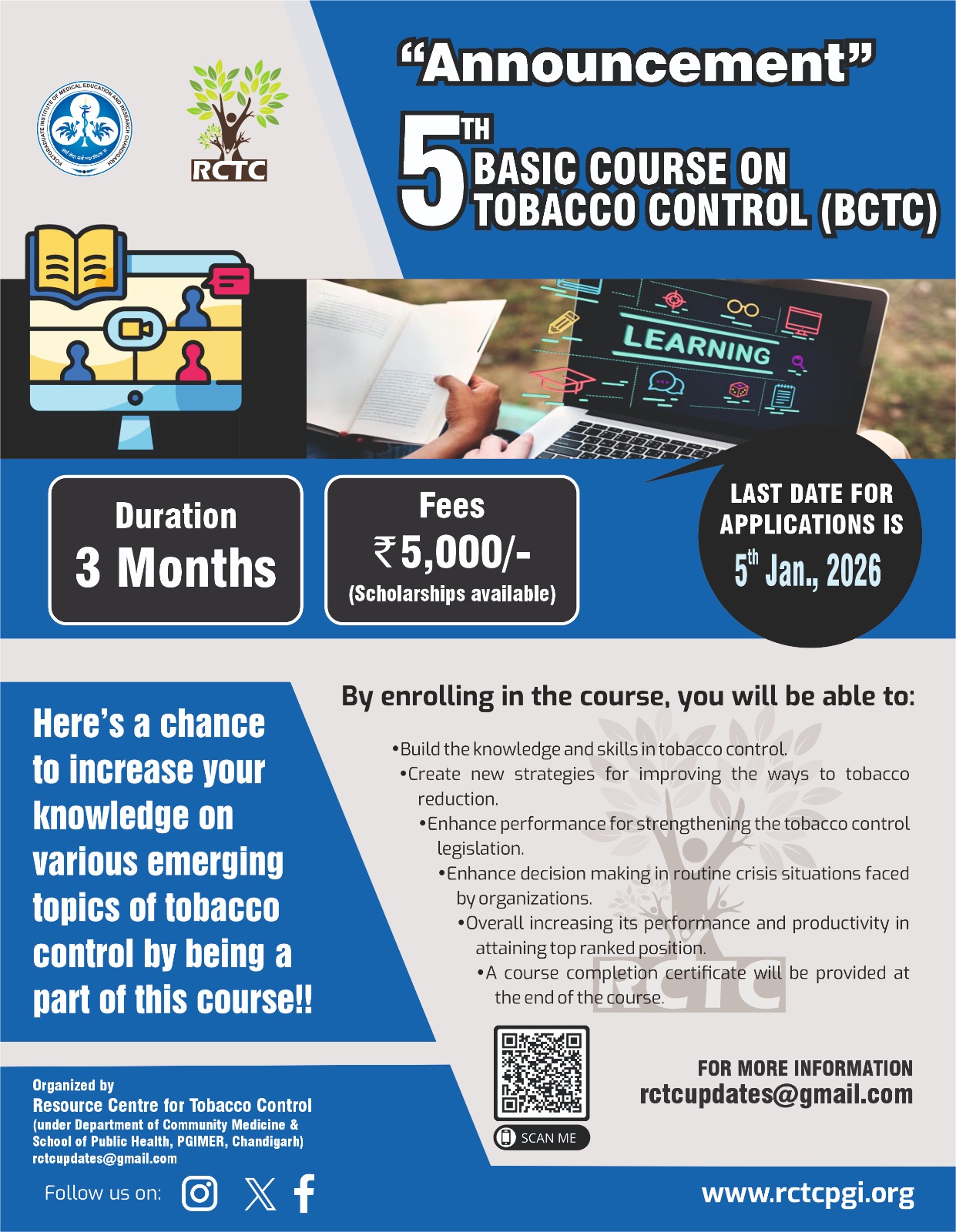
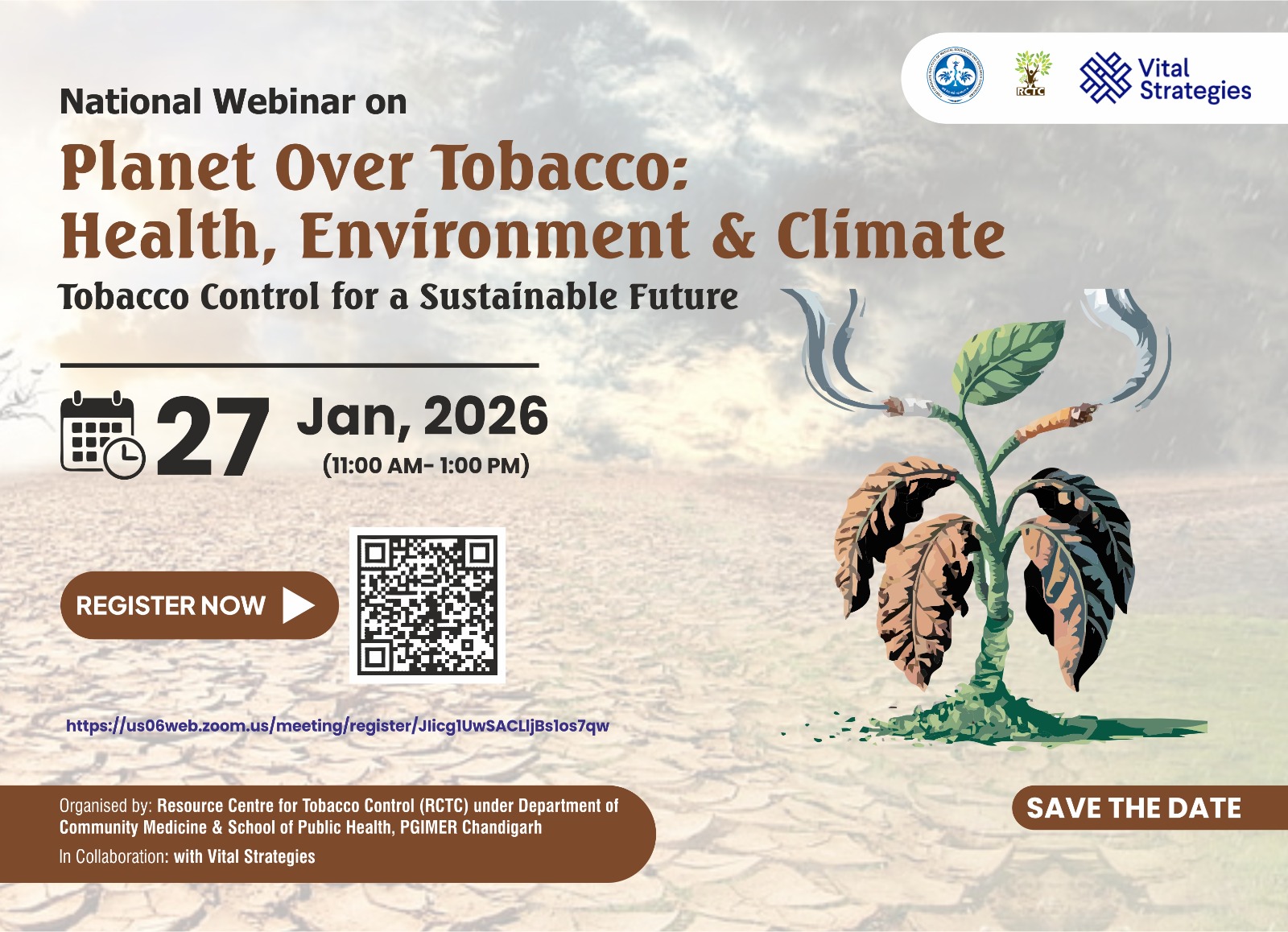
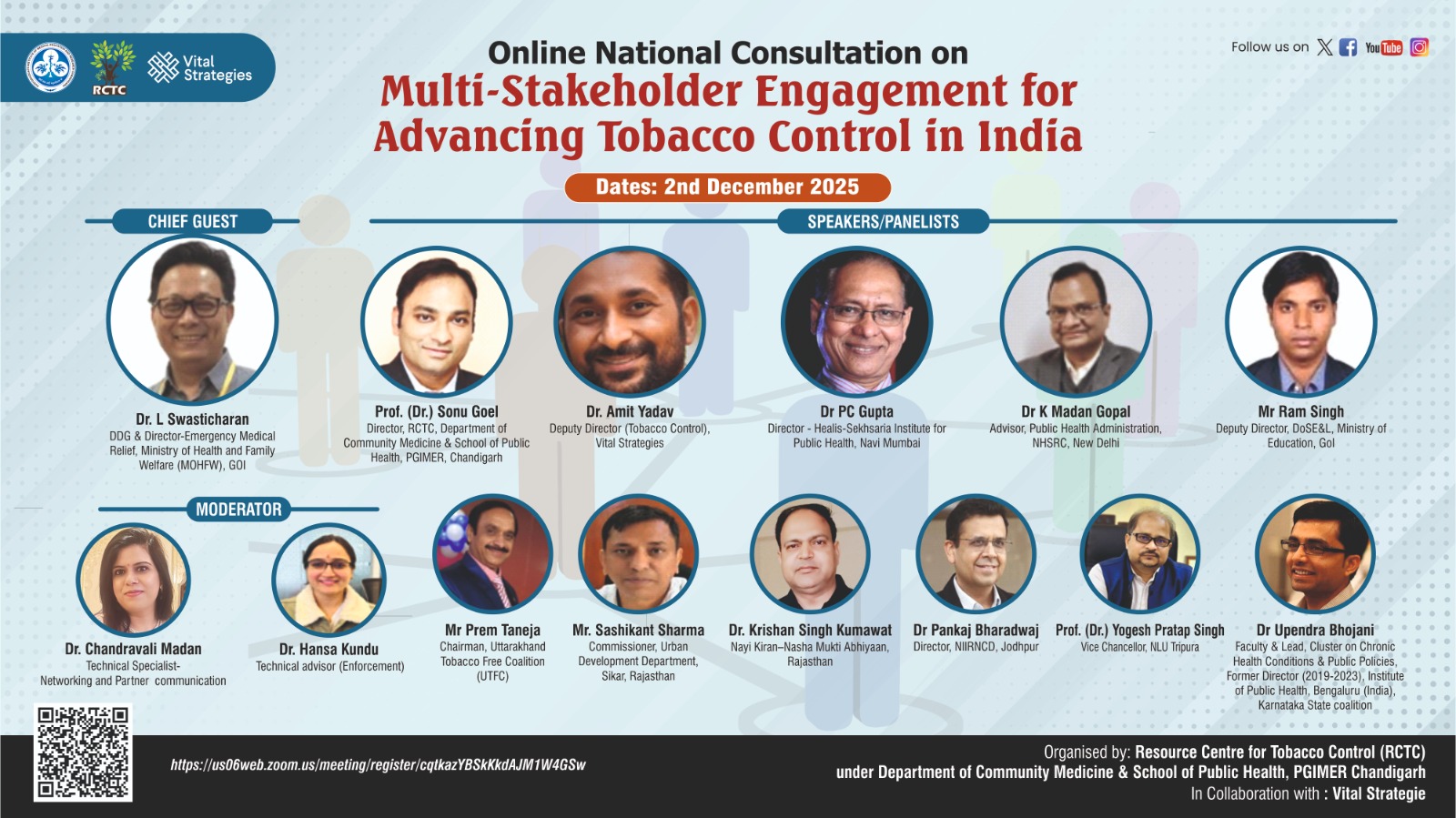
National Consultation on "Multistakeholder Engagement for advancing tobacco control in India"
Read More
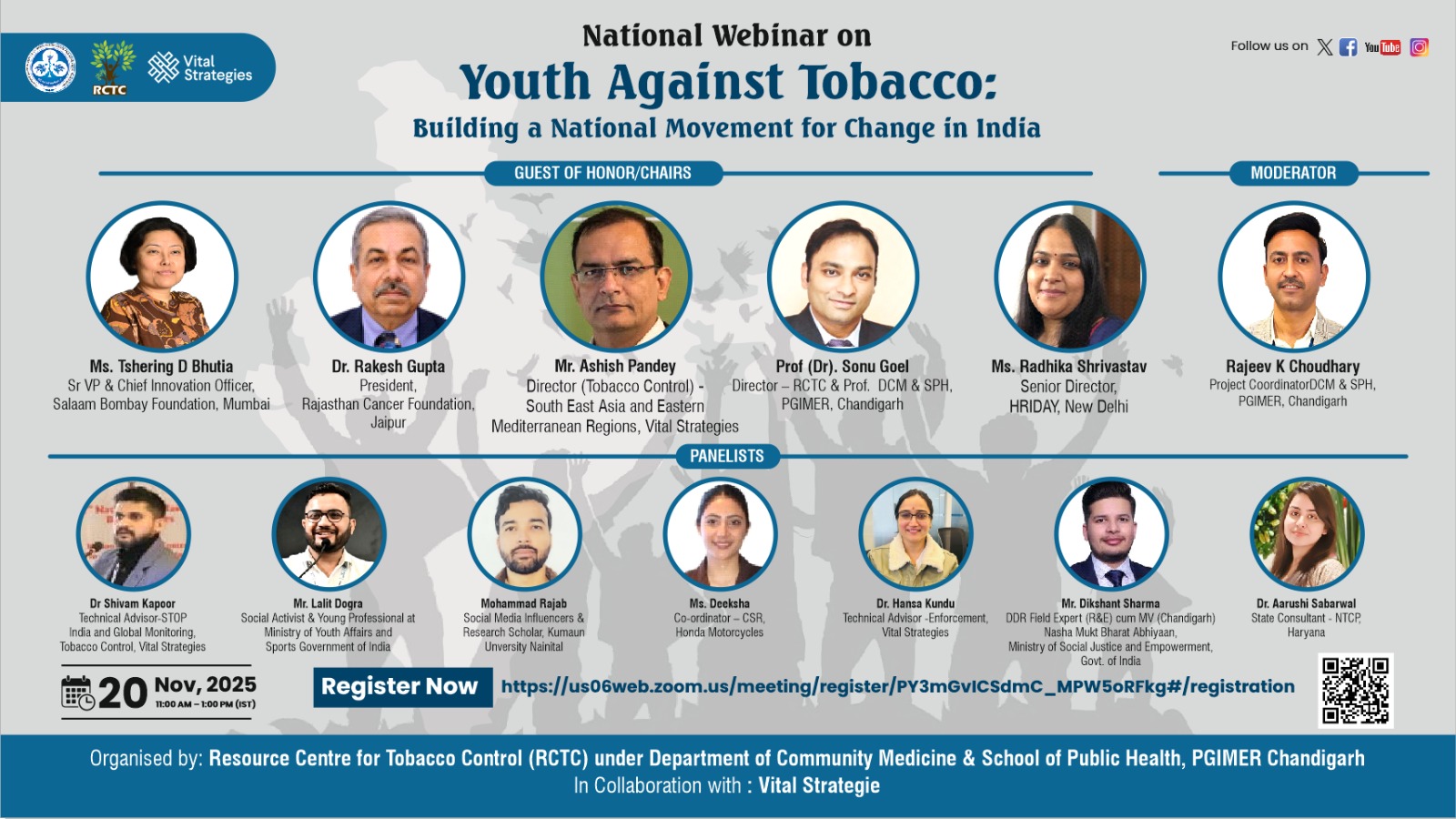
National Webinar on Youth Against Tobacco: Building a National Movement for Change in India
Read More
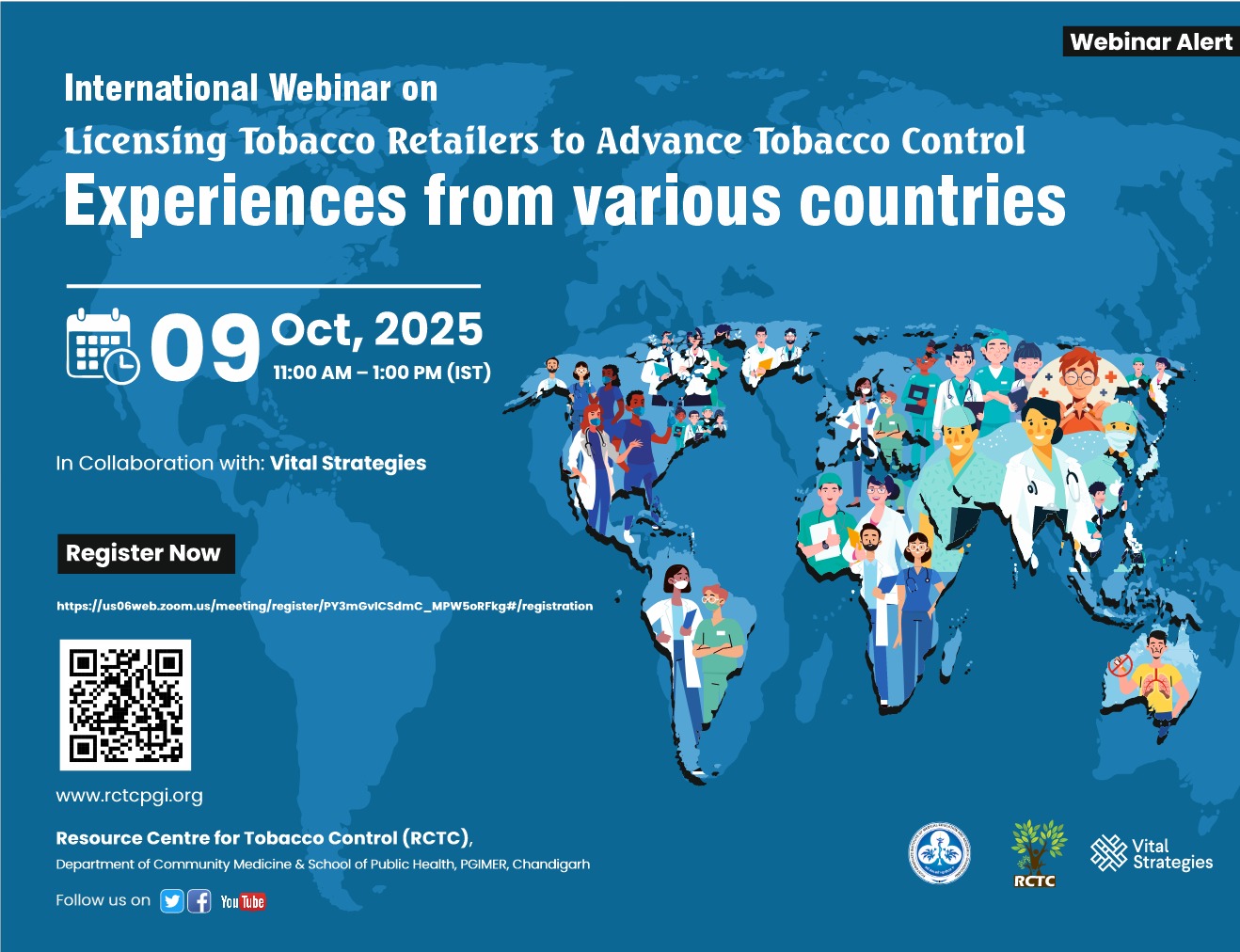
International Webinar on Licensing Tobacco Retailers to Advance Tobacco Control Experiences from various countries
Read More
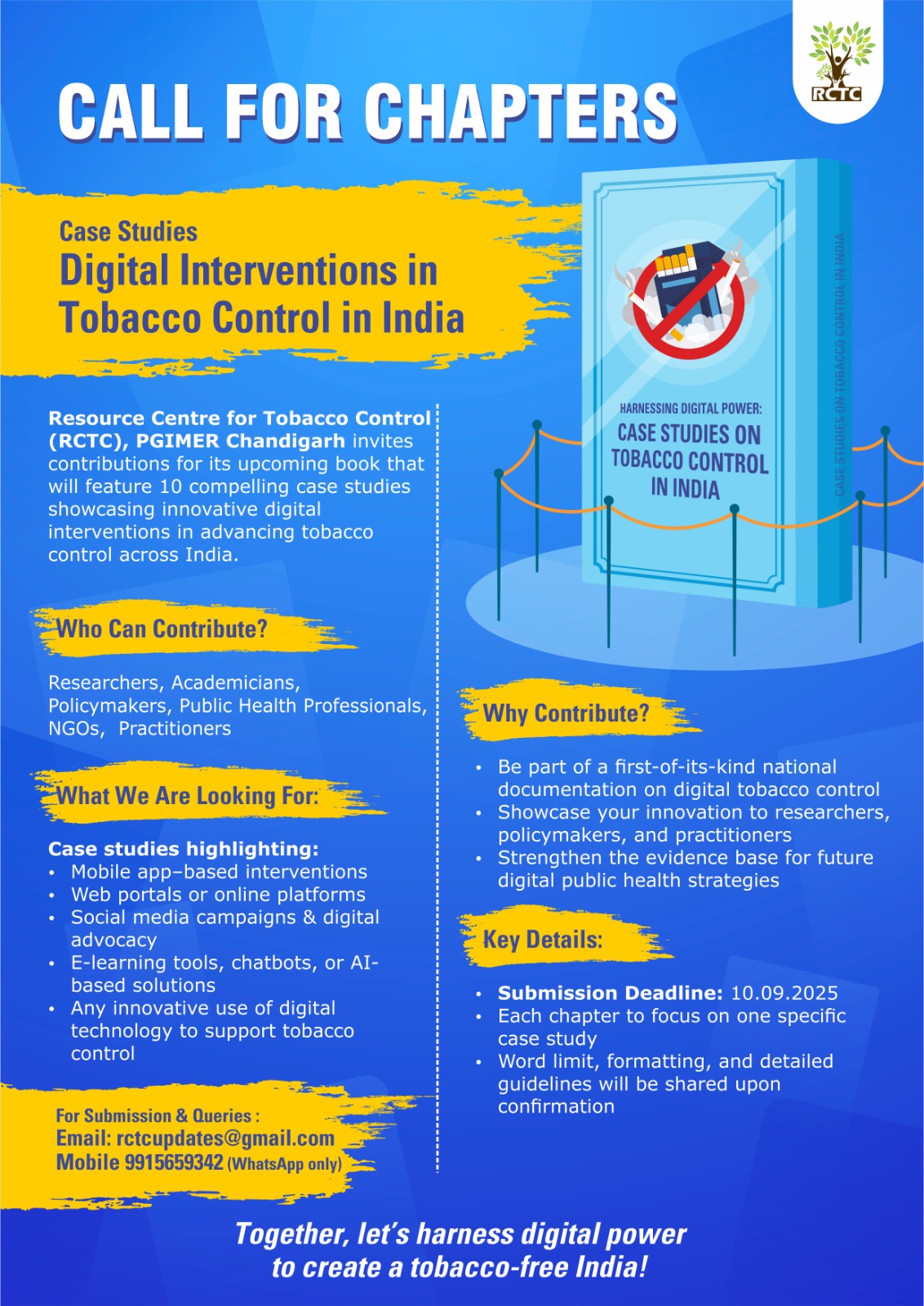
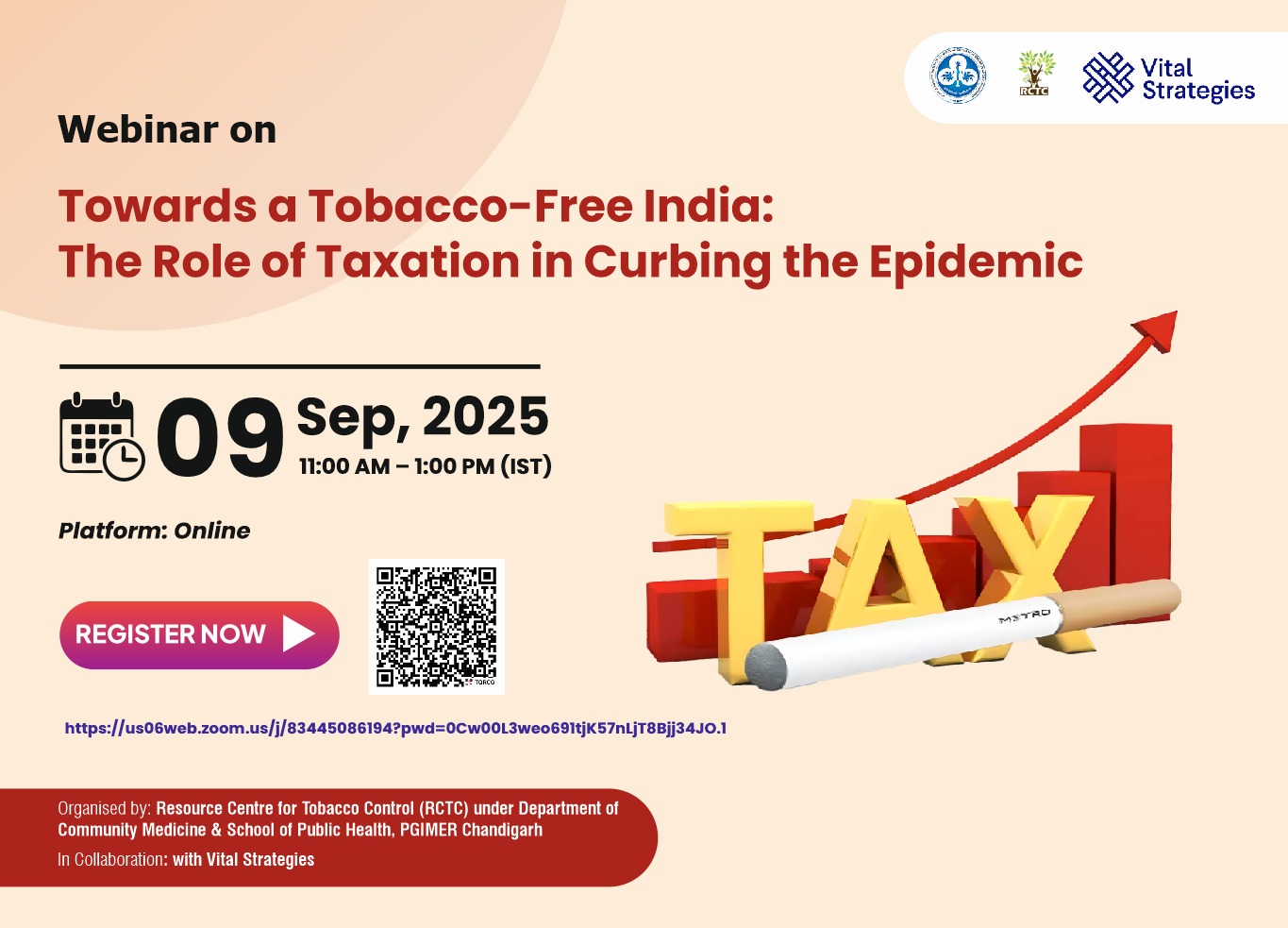
National Webinar on “Towards a Tobacco-Free India: The Role of Taxation in Curbing the Epidemic” (9th September 2025)
Read More
Expert Speaks
The team has put incredible efforts to consolidate information from all over the country and making the data approachable with ease to the researchers and policymakers. I appreciate the hardwork for providing valuable insight on strategies to tackle the burden of tobacco product waste in the country which will help us to achieve tangible benefits and making the nation tobacco free.
Tobacco use in India is intertwined with our colonial past and like a many-headed hydra has mutated from hookah and cigarettes to e-cigarettes and e-hookahs. E-Resource is one such initiative that brings all tobacco control activities under one umbrella. I find the website informative, user-friendly, and extremely interesting. More power to Dr. Sonu Goel and Team
In this digital era, keeping pace and utilizing technology to its fullest is vital. The e-RCTC platform has made information accessible to all the anti-tobacco warriors defying the boundaries to win this battle against tobacco. The initiative of team PGIMER to augment our learning lifecycle is commendable.
I congratulate the E-Resource Centre for Tobacco Control (RCTC) team for release of 13th edition of bi-monthly news letter “Tobacco Free Times”. Beyond a news letter, such effort would help the entire tobacco control fraternity to gain necessary information on relevant themes and activities to support the cause. In the present pandemic situation of COVID 19, I appeal everyone to refrain from tobacco use of any form, as it could enhance the spread of this virus and other such diseases. Further, I wish all implementers, policy makers and stakeholders for very strict implementation of guidelines and laws under tobacco control for greater interest of public health and well-being of the people at large. Best wishes for more success.
While it’s important to advise people not to start tobacco use in any form, it is also our responsibility as health care providers to encourage tobacco users to quit. Personalizing the risk of continuing tobacco use, motivating them with the positive aspects of quitting tobacco, supporting them in the quitattempt and addressing the underlying risk factors are important aspects of cessation support and we must train all health providers in these aspects.
Resource centre for tobacco control` realises that the tobacco industry by its pseudoscience, transfiguration of product and fallacious advertisements and marketing has obscured the users and the policy makers. Awareness, implementation of laws, tax policies are a must to sustain and promote effective intervention to reduce usage of tobacco.
The e-Resource Centre for Tobacco Control is the first of its kind an online hub contains latest information, policy initiatives and best practices from across the country. This helps policymakers and implementers in government and nongovernment settings in advancing tobacco control initiatives and supports in strengthening of National Tobacco Control Program.
RCTC is an excellent online portal that provides authentic and reliable information about the latest initiatives, policies, updates and resources in tobacco control from across the country to all its users from various backgrounds whether a grass root level worker or or an academician. This endeavour is a positive step towards strengthening National Tobacco Control Program and it’s activities in india
The Resource Centre for Tobacco Control serve as a model resource for all reliable information for state and district level managers working in tobacco control. It is a unique kind of a portal for tobacco control to assemble all the tobacco related documents under one roof.
The Resource Centre for Tobacco Control is a unique and dynamic e-learning platform, that facilitates knowledge exchange for strengthened tobacco control action in India. e-RCTC will provide a central focal point for all relevant stakeholders including decision makers, civil society organizations and academicians to collaboratively engage on the tobacco control agenda, with a particular focus on learning from national level leadership and sub-national level successes. RCTC will have user engagement as a central principle to its course modules and be designed to primarily connect, benefit and leverage the public health community.
I would like to acknowledge the contribution of the RCTC team and collaborators in conceptualising and allowing this special edition on COP9 and MOP2 along with extending the support for production and dissemination of this important issue to the policymakers and stakeholders engaged in the COP9 and MOP2 process. I am grateful to all the experts who agreed to contribute to this special edition and articulated the progress, priorities and perspectives on the important tobacco control aspects especially with a national and regional focus
I regularly wait for the edition of Tobacco Free Times to know the latest contributions in Tobacco Control on international and local platforms both by the Government and CSOs. The perspectives shared by eminent stalwarts of the field act as a guiding compass to further efforts at local levels in sync with national and international goals. I very much appreciate the efforts of this newsletter to document and disseminate the efforts to all relevant stakeholders be it activists or policy makers. Keep up the benevolent task.
Tobacco control needs multi-stakeholder sensitisation, engagement and action. Working with communities on creating awareness is important
I am pleased to learn and congratulate the E-Resource Centre for Tobacco Control (RCTC) team for the release of the 17th edition of bi-monthly newsletter “Tobacco Free Times’”, which is a joint initiative by PGIMER, Chandigarh and the UNION. Such initiative provides relevant and updated information across the themes of tobacco control to academicians, researchers, policy makers, program implementers, advocates and stakeholders of the cause. Smoking has a detrimental effect on the human health system, raising the risk of cancer, coronary, respiratory, and reproductive diseases. Further, realising the present pandemic situation of COVID-19, I appeal to everyone to refrain from tobacco use of any form, as it could enhance the spread of this virus and other such diseases. I wish all implementers, policy makers and stakeholders for very strict implementation of guidelines and laws under tobacco control for the greater interest of public health, focusing more on youths and adolescents to make them avoid tobacco use. Best wishes for more success
Tobacco Free Generation” is a concept close to my heart and I have seen with utter dismay that children as young as 6- years are chewing sweetened arecanut and tobacco in Pimpri-Chinchwad, Pune. Let us all pledge to fight this deadly menace together. I have accessed the RCTC in the past to know more about the status of ToFEI in different States of India.The information that I gathered helped me shape up the research paper that I was writing. Kudos to the team who has worked hard for providing updated information. - Dr. Sahana Hegde-Shetiya, Prof and Head, Department of Public Health Dentistry
I am pleased to be a part of and contribute to Resource Centre for tobacco control. It provides comprehensive details of all circulars, orders issued in India and iec for tobacco control. It keeps us updated about the recent advancements being done under the program. I appreciate the work being done by PGI Chandigarh – RCTC
Every person has the power to be a leader in creating a better future by starting with this remarkable resource hub. Take the first step and help future generations free themselves from tobacco
The e-Resource Centre for Tobacco Control is doing a commendable job by compiling the tobacco control related work across the country. It gives concise and crisp information for members working in tobacco control. This helps to get the updates easily and helps us to galvanize our contribution towards tobacco control. The latest edition on Tobacco free generation infuses momentum and new energy towards tobacco end game. I hope the tobacco free times will continue in future too and help in the battle against tobacco. Congratulations and good luck to the entire team working for this newsletter.
There is a strong need to take data and evidence into action to maintain balance between demand and supply reduction activities. The current hub is great platform for all this and stressed upon generating more evidence for policy advocacy.
This is promising initiative for tobacco control globally which is the preventable cause for noncommunicable diseases. It is really a good source of information for stakeholders that serves as one point reference centre. It’s a unique initiative that will immensely help the people implementing tobacco control programme at the grassroots level.
There is a need to rope in advocates and more people working on the legal aspects of the tobacco industry, create more influencers and leaders from different fields and areas of india The Resource centre for tobacco control is the right hub for this.
Plain packaging has been shown to reduce the tobacco product appeal and increase visibility of health warnings thus promoting quitting among its users.
There is need for application for plain packaging for wide range of tobacco products. The Cost effectivity of these products vs use of tobacco and nicotine products not covered by plain packaging, where applicable, needs to be undertaken. While packaging has been a cornerstone of tobacco marketing there is a need to appreciate value of plain packaging and combat the enormous health implications of tobacco use especially in developing nations like India. –
The Resource Centre for Tobacco Control-PGIMER has done a fantastic job in creating a platform that brings together all key stakeholders from various departments to promote awareness and education on the COTPA, other National Tobacco Control Program initiatives, and the harmful effects of tobacco on public health. This convergence of sectors will help in effectively reaching and educating communities on important legal amendments and health initiatives. I congratulate the technical team for their dedication and hardwork in creating this valuable resource centre.
RCTC has emerged as a go-to source for antitobacco-related news, policies, and updates. I was fortunate to attend a regional-level workshop on NTCP held in Hyderabad, which was conducted by RCTC. The workshop provided me with a deep insight into various anti-tobacco issues and I am grateful to RCTC for being a valuable resource for tobacco control at the national level.
The E-Resource Centre for Tobacco Control is a great initiative as it emerges as a one-stop shop for nationwide tobacco control efforts. Not only it allows a versatile experience at a glance through updated newsletters, user-friendly courses, workshops, and webinars; but it also provides a go-to repository for all the national and sub-national policy documents.
In a very short period, RCTC has become a trusted knowledge exchange for all key stakeholders in Tobacco Control. It’s praiseworthy. For greater & faster impact, this Centre can emerge as a Thought Leadership Institution and play a greater and more strategic role in Public Health and in TobaccoEndgame
RCTC (Electronic Repository of Circulars, Tobacco Control) is a noteworthy initiative of PGIMER Chandigarh and the Union government. It effectively reinforces the National Control Tobacco Programme (NTCP) by providing the latest notifications and circulars from the national and state governments. This makes it easy for all stakeholders to stay informed of best practices under the program.
The e-Resource Centre for Tobacco Control (e-RCTC) is not just a repository of information, but a vital tool that fosters networking and partnerships among the stakeholders through collaboration and knowledge-sharing to create a more cohesive approach to tobacco control
The e-Resource Centre for Tobacco Control is a one-of-a-kind and dynamic e-learning platform that promotes information sharing in order to boost tobacco control in India. It serves as a focal point for policymakers, organizations, and academics to participate and collaborate on the National Tobacco Control Program. This e-platform is also a motivator for young minds to learn about the harmful consequences of tobacco.
E- RCTC to my mind stands out in many respects, and in my personal view, it provides practically most of the resource materials required for effective tobacco control implementation with an enormous collection of notifications, guidelines, and so on. This easy access to required material is really useful for tobacco control programme implementers around the region. RCTC also organises an extensive number of webinars, courses and workshops on topics that are essential for tobacco mitigation. I wish & hope that RCTC continues to be an extremely valuable ally & storehouse of ever evolving information for all tobacco control stakeholders in the region.
Keeping up with the times and making the most of technology are essential in this digital era. The e-RCTC is doing quite well; it has arranged numerous webinars, courses, and workshops on topics crucial for tobacco prevention. The portal serves as a central information hub for all anti-tobacco activists who are pushing the limits to defeat tobacco control. I wish more power and success to e-RCTC.
Although the fight against tobacco is still a constant challenge, the Resource Centre for Tobacco Control stands as a beacon of knowledge and cooperation, providing policymakers, governmental agencies, and non-governmental organizations with the tools and necessary inputs to strengthen the just cause of tobacco control. This institution is a vital ally in the collective efforts to safeguard and prioritize public health and build a smoke-free future for all.
The Resource Centre for Tobacco Control has emerged as a major resource center for tobacco control in India. Its working framework can be implemented in other countries to achieve significant success in tobacco control. I congratulate the team of RCTC for creating such a great platform in India, a one-stop platform for hosting multifaceted information about tobacco control such as national and state policies, and consultation reports. I wish them the best in their future endeavors to eradicate tobacco from India.
Tobacco Control needs to be taken up as a social movement and an all-government approach. The control efforts made by various stakeholders need to be concerted and well-orchestrated for logical results for an ultimate tobacco endgame in this world. This journey would need information, data, research studies, best-practices etc. under a roof. If you are looking for one such source, please look at the www.rctcpgi.org. I congratulate PGIMER, Chandigarh and the Union for this good initiative. Let us all populate this source with richer information for action.
All our implementers, academicians and stakeholders will have access to relevant information through the RCTC that serves as a one-point reference centre.
The E-Resource Centre for Tobacco Control (e-RCTC) stands as a pioneering and dynamic e-learning hub dedicated to fostering information exchange for the advancement of tobacco control efforts in India. Functioning as a robust support system, RCTC reinforces the objectives of the National Tobacco Control Programme (NTCP) by disseminating the latest notifications and circulars issued by national and state governments.
The Resource Center for Tobacco Control(e-RCTC) has emerged as a leading organisation in India’s battle against tobacco. It is a one-stop destination for policies, manuals, best practices, notifications etc. The e-RCTC’s user-friendly interface and the prompt dissemination of crucial notifications have proven instrumental in tobacco control endeavors. I commend the center for its commitment to fostering collaboration and knowledge exchange in the global fight against tobacco.
Resource center is a hub and a pool bank for tobacco control. The center is putting lot of hardwork in accumulating the notifications, orders and important material from each state of the country. I wish very best to the team for all the good work.
One stop shop! it’s amazing we can go to RCTC and get to know anything with relation to tobacco and efforts towards its control.
RCTC is providing the leadership for advancing tobacco control in India in the most comprehensive way. Further, it is also giving the due thrust to the future perspective through TEDH (The Endgame Hub) since tobacco control hasn’t given the anticipated outcomes, not only in India but globally as well. At present, an elimination of the tobacco industry through a systematic phase-out appears as the most suitable strategy to counter the tobacco menace our country is facing currently as one of top high-burden tobacco countries world over
RCTC is making remarkable strides in its mission. It’s inspiring to see RCTC reaching new heights, already addressing a wide range of topics and fostering deep-rooted learning. Their webinars are exceptional, offering practical solutions and guidance for those looking to quit tobacco. Together, we can create a significant impact. Let’s unite in the effort to quit tobacco.
PGIMER’s Tobacco Control Hub stands as one of India’s foremost resource centres. I am greatly impressed by the work Dr. Sonu Goel and his team are doing. Collaborating with RCTC, and PGI would be highly beneficial, allowing us to receive regular updates and follow-ups from the RCTC team. This close and collaborative approach will strengthen our efforts significantly.
RCTC is doing an excellent job of spreading the message of No Tobacco Day. I have personally attended their courses on tobacco control and gained extensive knowledge on managing tobacco use at both individual and community levels. The courses also delve into the historical aspects of tobacco control. This year, let’s all pledge to promote the message: Say No to tobacco.
RCTC is a wonderful initiative for advancing Tobacco Control in India. It is definitely a go-to portal for Tobacco Control documents and other data relevant to policymakers, implementers and academicians. Congratulations and kudos to Dr. Sonu Goel and the team at RCTC.
I am extremely happy to write my observations on RCTC, which is doing an exceptionally good work in this important field of Tobacco control. Dr. Sonu Goel is doing an exceptional work updating the scientific community in recent updates in tobacco control & endgame. I wish him & RCTC all the success in his endeavours.
RCTC is excellent and their team is a dedicated team. I am really grateful that I am now the part of this organisation. Best wishes to RCTC in its missions to end evil effect of tobacco use in India Together we will achieve it definitely.
I joined the RCTC network and its activities in March 2024, and have since been actively following and implementing them within my own institute. This experience has greatly enhanced my conceptual understanding, and I now feel confident that I am part of a reputable organization.
RCTC is a true inspiration to work with, demonstrating how public health issues can be effectively addressed through motivation and collaboration. I am pleased to be associated with RCTC
All our implementers, academician and stakeholder will have access to relevant information through the RCTC that serves as a one-point reference centre.
It’s a unique initiative that will immensely help the people implemen ting tobacco control programme at the grassroots level.
It will help in the implementation of tobacco control laws and programmes
E- RCTC is unique in many ways and my experience is that it gives almost all the information needed for tobacco control activities with immense collection of notifications, guidelines etc. This is very helpful, especially for a state which is starting to implement tobacco control programmes. I hope that RCTC continues to serve very useful resources for all stakeholders in the country and globally as well.
RCTC intend to catalyze tobacco control activities in the country and foster multi-sectoral convergence between organizations for 'Tobacco Free India'. This will help government, academia and nongovernment sectors to effectively implement tobacco control initiatives.
The e-Resource Centre for Tobacco Control is a very valuable asset from which tobacco control researchers, advocates and policy makers can draw updated information and documentary resources to support and guide their work. It is the beating heart of the tobacco control movement in India.
Tobacco consumption is assuming a bigger threat to the people’s health. It is not only behaviour change which can prevent the ill effects of tobacco but also good advocacy with the various stakeholders can help in meeting this challenge. Policy makers, planners and managers also require evidences for better decision making. RCTC can bridge this gap can help in efforts of mitigating the effect of tobacco.
The E-Resource Centre for Tobacco Control (ERCTC), an initiative by Post Graduate Institute of Medical Education & Research (PGIMER) Chandigarh provides all relevant information related to tobacco control under one roof. The RCTC showcases a repository of latest orders, circulars, notifications & many others that are being released from time to time both by the state and central governments to curb the tobacco menace. The RCTC would also help counter the misleading facts on tobacco control which exist on various web engines
The E-Resource Centre for Tobacco Control (ERCTC), an initiative by Post Graduate Institute of Medical Education & Research (PGIMER) Chandigarh provides all relevant information related to tobacco control under one roof. The RCTC showcases a repository of latest orders, circulars, notifications & many others that are being released from time to time both by the state and central governments to curb the tobacco menace. The RCTC would also help counter the misleading facts on tobacco control which exist on various web engines
The e-Resource Centre for Tobacco Control is a very valuable asset from which tobacco control researchers, advocates and policy makers can draw updated information and documentary resources to support and guide their work. It is the beating heart of the tobacco control movement in India.
Tobacco Control needs to be taken up as a social movement and an all-government approach. The control efforts made by various stakeholders need to be concerted and well-orchestrated for logical results for an ultimate tobacco endgame in this world. This journey would need information, data, research studies, best-practices etc under a roof. If you are looking for one such source, please look at the www.rctcpgi.org. I congratulate PGIMER, Chandigarh and the Union for this good initiative Let us all populate this source with richer information for action.
PGIMER’s E-Resource Centre is a storehouse of knowledge about tobacco control. To see it being used so broadly is a testimony to that. Its website is a great boon to professionals, offering a quick and easy way to find information on all aspects of tobacco control.
For quite sometime there was a need felt to have one-stop window for all information on tobacco control. The RCTC greatly fills this gap for the country. We at NICPR and the WHO FCTC Global Knowledge hub on Smokeless Tobacco remains committed to contribute, share and use the information from this unique platform.
